JOURNAL





























Ludlow Brewing Co. commissioned their first solar PV system in 2021. A year later they doubled the size of it. And then they doubled it again.
At CleanEarth we’ve been working with them since their first foray into solar generation, and have brought their installed capacity up to 120 kW. They are now generating their own clean electricity at less than 4p per kWh. That’s a small fraction of what they were paying for power from the grid.
With cost savings like that – and with more than 20 tonnes of carbon kept out of the atmosphere every year – it’s no surprise they keep coming back for more.







“Solar power is the cornerstone of our sustainability strategy. CleanEarth have been instrumental in future-proofing the brewery’s energy infrastructure, to help us create long-term operational e iciency and reduce emissions and costs.”
Gary Walters Managing Director, LudlowHere are some of the other breweries we’ve worked with:
• Goodh Brewing Co.
• Le Handed Giant
• Moor Beer Co.

• Keltek Brewery
• Verdant Brewing Co.
• Wiper & True

There is no doubt that we are living through a period of unparalleled climate change. To quote the Secretary General of the United Nations, Antonio Guterres, “the era of global warming has ended; the era of global boiling has arrived”.
Last year, 2023, was the warmest year on record with an average temperature increase of 1.35C above pre-industrial times. For consecutive months the increase in temperature reached 1.5C, which is the maximum limit set at COP21 in Paris in 2015.
just greenhouse gas emissions. In 1987 the United Nations Brundtland Commission defined sustainability as “meeting the needs of the present without compromising the ability of future generations to meet their own needs”. Despite having many meetings, setting many targets, and giving many promises we are as far away from that aspiration as ever. It is about our children and grandchildren enjoying a similar quality of life as ourselves.
We accumulate money to be able to leave our children an inheritance, but we have not invested in the changes needed for a sustainable future.
There is a clear link between climate change and the concentration of carbon dioxide in the atmosphere, insulating the Earth and preventing heat escaping. For centuries emissions were balanced by the natural carbon cycle where carbon dioxide is taken up by plants on land and algae in oceans to maintain a stable atmospheric CO2 concentration of under 300 mg per litre of air.
After 1900, industrialisation, burning fossil fuels, (coal, gas, and oil) released bound carbon dioxide into the atmosphere overwhelming natural cycles, resulting in higher concentrations of greenhouse gases which has risen to 424 mg per litre of air last year.
CO2 remains in the atmosphere for between 300 to 1000 years and if we are to continue to enjoy our current quality of life, then all individuals and stakeholders in industry and Government must work together to reduce carbon emissions immediately.
However, the impact of human activity on the environment goes much deeper than
Our brewing industry is in a unique position to showcase how industries can work together towards our climate change goals.
Unlike most industries, brewing sources most of its ingredients: water, energy (electricity and gas), as well as malted barley, locally and most of its packaging materials are recycled.
It allows for close co-operation with growers and suppliers, minimising the length of the supply chain. Most craft beers are supplied to the domestic market either through pubs or supermarkets and off licences making it easier to influence the supply chain and making logistic and environmental savings.
Using regenerative farming techniques minimises the need for artificial fertilisers and pesticides reducing carbon emissions as well as benefits to biodiversity, cutting pollution of water sources and providing improved soil conditions. Regenerative farming practices use livestock and cover crops to improve
soil organic content. Organic farming is similar with a focus on using natural methods across the whole farm, not just for soil health, with benefits to biodiversity encouraging natural insect predators in place of pesticides and reducing fertilisers polluting water sources.
The actual brewing process itself has a relatively small carbon footprint mainly associated with energy requirements (scope 1 and 2).
Scope 1 includes gas which can be replace by biomass, hydrogen or other low carbon fuel sources and Scope 2 is principally electricity which can be supplied from green energy sources and on-site generation through wind turbines or solar panels. The recent energy price increases principally due to the Ukraine war have made projects which might have had paybacks over several years cost effective in under a year.
Packaging, particularly for craft brewers is another opportunity for businesses to save resources and money. For many a significant proportion of sales is through a brewery tap room which uses returnable packaging requiring no delivery. Most other sales are in keg and cask which are fully recycled, and Councils provide facilities for recycling empty small pack containers.
Brewing enjoys a close relationship with its customers through brewery visits, brewery tap rooms and selling “greener” draught beers through pubs, allowing it to promote its good environmental practices to the consumers. The brewing industry is well positioned to reduce its greenhouse gas emissions to achieve sustainable net zero and improve the environment through a few important changes.
Here are some ways we can action this…. We can source brewing materials from farms that use regenerative practices, we can use on-site or commercial green energy supplies, we can make the process as efficient as possible and reduce waste and water usage, we can recycle and repurpose as much as possible in the brewery. When it comes to recycling, we can use recyclable packaging as much
as possible and make it easy to return and reuse. We can source and deliver locally to minimise transport, and we can deliver beer in bulk reusable containers and support the on-trade as the preferred location for social drinking. Let’s make improving the environment cool. We can make the brewery and taproom welcoming, by sharing your achievements. We can encourage good environmental practices from your customers, make it a green space (pot plants will help!) provide incentives to customers who arrive by walking or bike rather than cars and provide EV charges on site. Lead by example showing how the company is committed to a better tomorrow.
We should hold authorities’ feet to the fire and ensure they deliver on their legal obligations and their promises. For example, the average volume of waste from households which is collected for recycling and was recycled by all English councils was 44.1% in 2021 (ref gov.uk). As brewers we must avoid “green washing”; making unsubstantiated or unverified claims destroys the credibility of any declared benefits. Let’s avoid “outsourcing” this is just kicking the can down the road. Invest money in green projects for the brewery or in the supply chain.
Planting trees is great and will improve the environment and capture carbon but should not be an excuse to put off making other investments to reduce emissions. Breweries can also benefit from carbon capture which removes CO2 from the atmosphere. Many systems are complex and involve storing carbon as carbonates in deep in the earth.
However, simple carbon capture is practiced by Khmer Beverage, a brewery in Cambodia, which bubbles boiler exhaust fumes through a tank of spent caustic trapping the CO2 and neutralising the alkalinity, a good example of win-win. Being “environment-ale” does not have to be difficult and should be self-funding. Looking after the environment has benefit for the employees, is better for the profits and will receive endorsements from the customers.
Tim O’Rourke
At OneCircle our message is clear, we are the market leader in PET Kegs worldwide, it is our mission to supply customers with a range of Kegs to suit their needs be it exporting their beverages, reducing the losses and costs of stainless steel kegs during the export and return process or supporting their current stainless steel fleet over peak times.

KeyKeg and UniKeg are both designed to be circular. They both have less weight than other packaging formats and use less water in the filling process. Each keg used can reduce the Co2 emissions in certain delivery distances and the returns process along with maximising the volume of Kegs that can be shipped per pallet due to the lightweight materials and stackable designs.
Circularity is always our main focus and in 2023, we reached a total of 50% RPET in every Keg. We see our active collection community of 10 partners in the UK supporting us with increasing our percentages year in year out and we see our mission of 2005 active when customers talk to us about the Keg they filled in Manchester and exported to all over Europe/World, the returned to us via our collection network to be recycled into new Kegs.
KeyKeg is proven to be more environmentally friendly than steel kegs, especially when travelling longer distances. It is only logical that eliminating return transport, polluting chemical washes, and allowing 25% more product per transport will be more green. KeyKegs are 100% recyclable when empty and comply with the strictest environmental regulations worldwide.
Less waste; drafting a Keg until the last drop with the bag in Keg system.
• Transport; No need to transport empty Kegs back to the brewery. Especially on long distance, this will save a major impact on the CO₂ emissions.
Carbon footprint; save CO₂ emissions when exporting your beer >1200 km by using KeyKeg instead of steel kegs.
• Recyclable; 86% usage of mono materials. All materials.
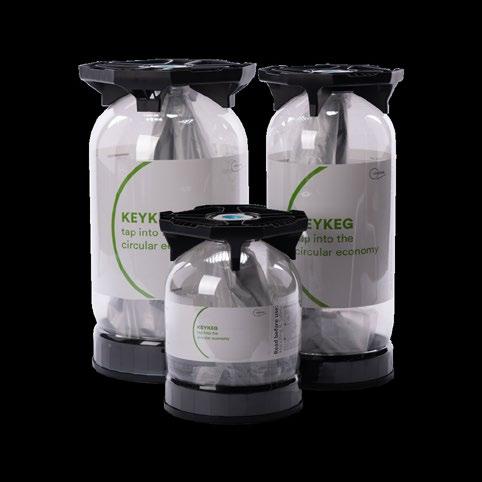
Recycling Waste
Carbon Calculator
The lowdown on a new carbon footprint calculator has been created to help small craft brewers identify the scale of their carbon emissions.
Glass Packaging
The argument for why glass should be the number one packaging choice for breweries.
Supply Chain
Why making more informed decisions throughout the product lifecycle and supply chain can help reduce our sector carbon footprint.
Brewhouse Technology
How brewhouse manufacturers are helping customers improve efficiencies and cut wastage.
Nitrogen Generation
Why nitrogen generation could be the right choice for your brewery.
Advanced Hop Extracts
Why liquid hop products align with the global call for a more sustainable and eco-friendly future in brewing.
Running a business that prioritises both the environment and local communities is no mean feat. However, it’s a challenge that Wells & Co. tackled head-on.

Solar Power
While many breweries are discovering the benefits of solar power, a few early adopters are already doubling down on their investment.
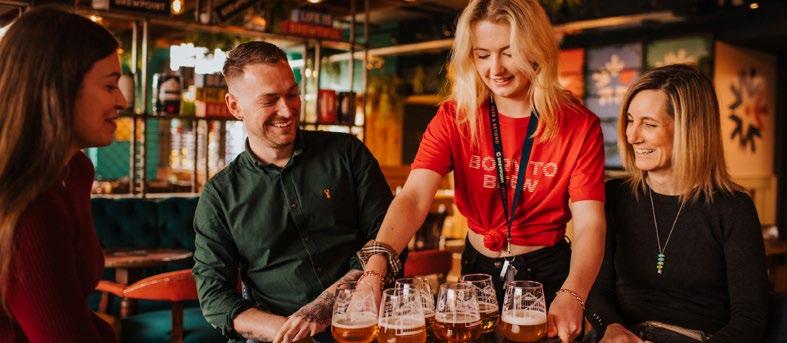
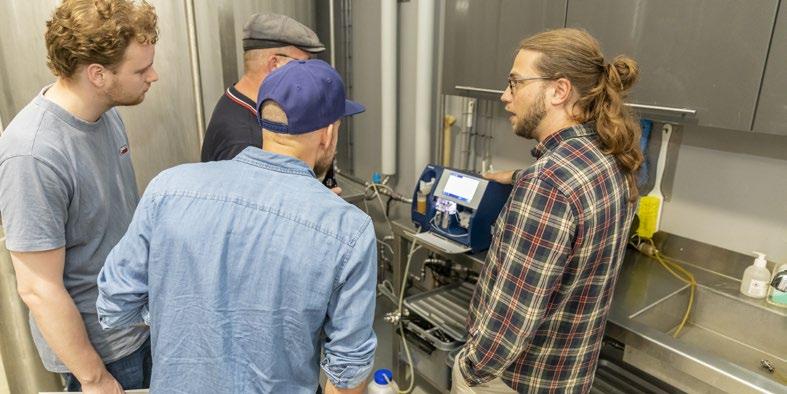
Analysis Technology
Technology is far from being able to solve all of our problems, but it can help with some, explains Marian Elisa Reed from Foss.

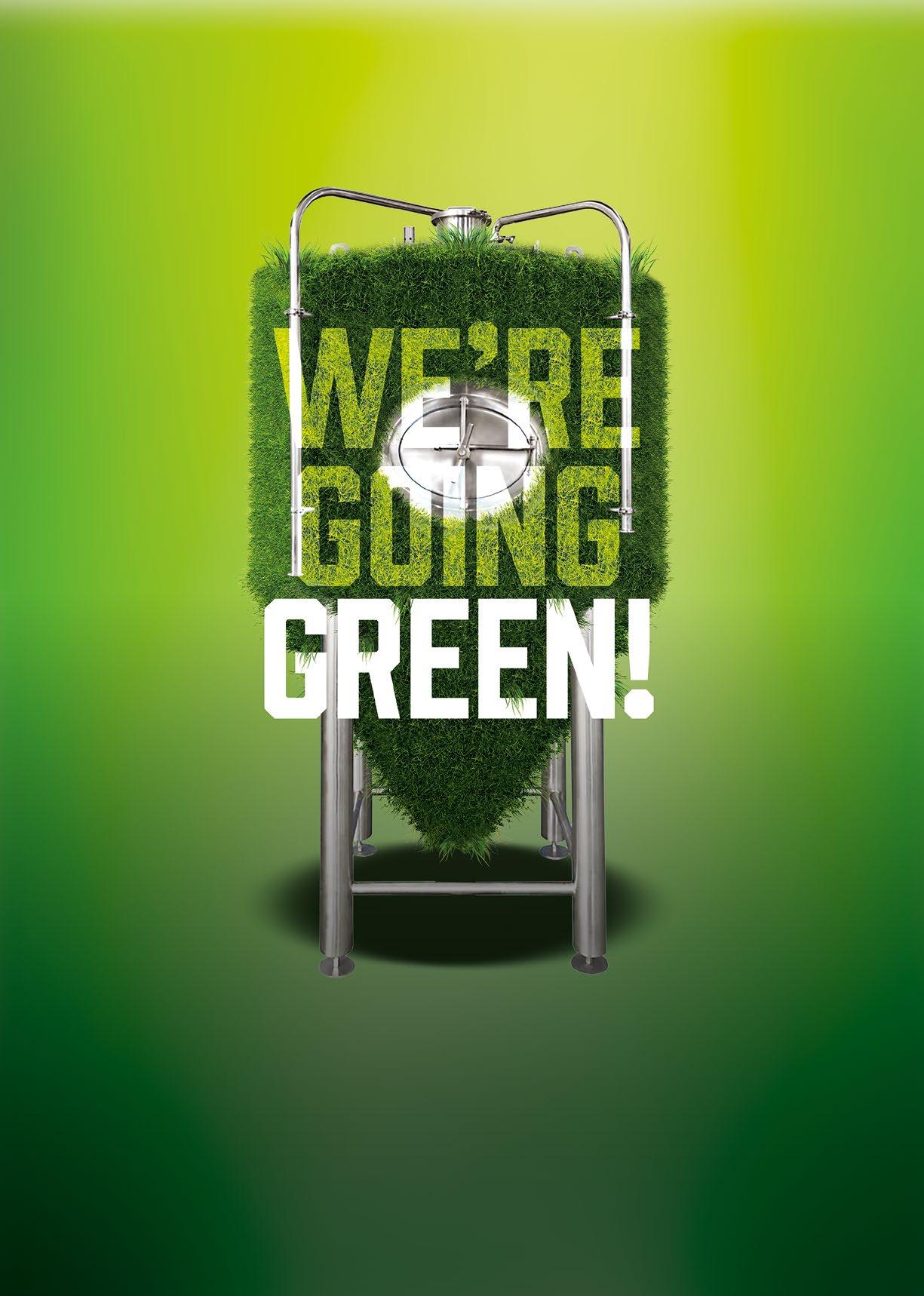
SSV are actively looking to reduce our carbon footprint...
To help kick-start our commitment to greener brewing, we’re proud to introduce our revolutionary CO2 RECOVERY UNITS
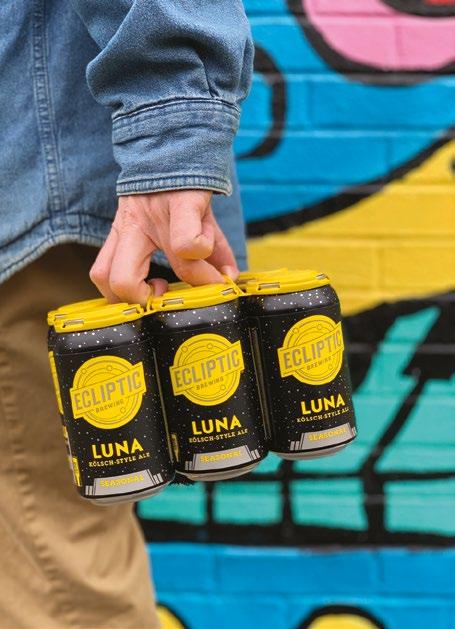







CALCULATOR HAS BEEN CREATED TO HELP SMALL CRAFT BREWERS IDENTIFY THE SCALE OF THEIR CARBON EMISSIONS. HERE’S HOW YOUR BREWERY CAN BENEFIT FROM IT.
Anew carbon footprint calculator has been created designed to help craft brewers identify the scale of their carbon emissions. Developed by a research team led by the University of Leeds, the freely available calculator - which can be downloaded as an Excel document from the figshare website - will enable breweries to see how sustainable their operations are.
There is a wide variation in the carbon emissions produced by craft brewers, with packaging playing a key role.
Beer distributed in 20 litre steel kegs has a carbon footprint seven times smaller than that distributed in 330 ml glass bottles - 205 versus 1,483 grams of CO2 equivalent per litre of beer.
With independent brewers, which includes the craft beer industry, showing signs of bouncing back after lockdown, the researchers are keen to help these small to medium size enterprises
develop best practice when it comes to sustainability and in cutting carbon emissions.
Data published by Statista in December showed that there were 1,902 independent breweries in the UK in 2021, an increase of 86 over the 2020 figure. The research paper accompanying the carbon calculator - “Development of an open-source carbon footprint calculator of the UK craft brewing value chain” - has been published in the Journal of Cleaner Production.
For small brewers, sourcing the key facts and figures needed to calculate their carbon footprint is both expensive and technically challenging, and can require the use of proprietary software.
Alexander Bowler, a researcher in the School of Food Science and Nutrition at Leeds in collaboration with researchers at the universities of Nottingham and Sheffield has created an open-source

calculator which will guide brewery managers through the process, simply and at no cost.
Baseline data “hard-wired” into the calculator will enable brewery managers to estimate carbon emissions across the entire production process, from growing and sourcing raw ingredients to producing and transporting the beer, with account taken of the way the beer is packaged, which can have a big effect on carbon emissions.
Dr Bowler said: “When a small brewery is doing its carbon reporting, one of the challenges is finding a lot of the numbers you need to use.
“For example, transport emissions or emissions associated with energy usage are quite easy to source, but there are lots of other data to do with materials such hops and barley that are harder to find.
“You need these numbers and specialist conversion factors, and we have got them all in the carbon footprint calculator from reference sources.”
Brewery staff input their production data into the calculator and the calculator produces a figure for overall carbon
emissions with a breakdown for different stages of the value chain.
Marcos Ramirez runs the Piglove Brewing Company in Leeds with two colleagues which produces 12,000 litres - just over 21,000 pints - of beer a month. He says the calculator will improve the accuracy of the estimates of his brewery’s carbon emissions.
“As a business we have a responsibility to society to reduce our carbon footprint, but we operate in a niche market and finding the baseline data to calculate carbon emissions is challenging,” he said.
“There are a lot of tools that can be applied more generally but nothing to help with very specialised industries like brewing, where often the baseline data we have had to rely on comes from the US - and that introduces inaccuracies into our calculations.
“So, this new calculator will be a major improvement.”
Professor David Cook, Professor of Brewing Science at the University of Nottingham and co-author of the
paper, said: “Whilst there are companies offering their own carbon calculators and consultancy to the industry, the beauty of this tool is that it is hands on for the brewers themselves and will be accurate enough to point them towards the main areas they need to focus on in the journey towards net zero.
“Helping brewers stay at the centre of key decisions impacting their carbon footprint will drive improved competitiveness and performance by raising awareness across the sector.”
Professor Nik Watson, also from the School of Nutrition and Science at Leeds who oversaw the research, said once small breweries have a picture of their carbon emissions, they can then look at ways of reducing them, and that will have wider sustainability benefits.
His team is working with the Piglove brewery to identify how low-cost sensors can be used to measure the efficiency of parts of the production process such as water use, energy consumption and minimising waste.
They are also using a probe based on the principle of a tuning fork to measure the resonance and hence the density of wort in the fermentation vessels – to judge whether the beer is ready to package.
The sensor is part of a cloud-based technology developed by a company called Plaato that sends data to a mobile phone.
Professor Watson added: “These are small businesses, and they cannot afford the high-end sensors that the large breweries use. But there are other, smaller smart instruments that can be harnessed.
“By working with breweries, we can show that sensors can provide real data and that can help them with decisions about changes to production processes or raw materials to reduce carbon emissions and improve sustainability.
“This real data will show how various interventions are working. Many people involved in the craft brewing industries are natural innovators and they want to make their operations as green as possible.”


IN THE WORLD OF BEER PACKAGING, THE CHOICE BETWEEN GLASS AND CANS CAN SIGNIFICANTLY IMPACT BOTH THE ENVIRONMENT AND THE PERCEIVED QUALITY OF THE PRODUCT. HERE DAWN PUGH, SALES AND MARKETING DIRECTOR AT BEATSON CLARK, BELIEVES THAT GLASS SHOULD BE THE NUMBER ONE PACKAGING CHOICE FOR BREWERIES.
As well as increasing sustainability, there are a number of other benefits that come with switching to glass packaging, including increased protection from harmful UV rays and giving a higher-quality feel to your products.
Thanks to 270 years of experience in the glass packaging industry, we are a popular choice for many breweries beer brands such as BrewDog, Robinsons and Greene King.
We offers standard beer bottles, customised bottles and completely bespoke designs. This flexible approach allows the company to cater to a wide range of breweries, from smaller craft brands wanting standard bottles available from stock to larger companies looking for fully bespoke bottles from 500,000 units.
The sustainability factor sets glass apart from other packaging materials. Glass is 100% recyclable and can be melted down repeatedly to create new bottles without any loss of quality or integrity.
We currently use an average of 56% post-consumer recycled material for its amber glass containers and 36% for white flint. In addition, any industrial waste glass from the manufacturing process is also recycled back into the furnace, so there is zero waste and even fewer materials used.
The company is seeking to increase these levels even further but the availability of good quality cullet (waste glass that is ready for recycling) in the UK restricts the amount it can use.
British Glass is campaigning to keep as much recycled glass in the UK as possible. Currently 335,000 tonnes of glass are exported from the UK to mainland Europe annually.
This needs to stop or at least be reduced for the UK to be able to move towards a closed-loop glass economy.
The government recently announced a Deposit Return Scheme (DRS), a new cash incentive system to boost recycling from 2025.
Glass is not included in this scheme in Scotland or in the proposed scheme for England, as there is already an excellent system in place for recycling glass and turning it into new jars and bottles. This will come as a relief to brewers using glass to package their beer.
Many industry experts believe that including glass in the DRS would have a negative impact on the collection rate of glass in the UK, which is already at an impressive 74.2%. British Glass, supported by companies like Beatson Clark, have set out their ambition to increase this to achieve a 90% collection rate by 2030.
We contribute to the level of glass cullet in its packaging through its on-
site recycling plant, which processes approximately 42,000 tonnes of glass packaging each year.
Glass containers are recovered from kerbside collections, bottle banks and the hospitality trade and are then processed and melted in the furnaces to make into new bottles and jars, all on the same site in South Yorkshire. Using recycled materials in glass production helps to reduce energy, which is an important consideration when it comes to sustainable production.
Our dark amber glass bottles are perfect for beers, ales and ciders as not only are they sustainable, but they also offer over 90% protection from harmful UV rays, ensuring a longer shelf life. High levels of vacuum and carbonisation can be maintained over a long period of time in amber glass, unaffected by temperature or light. Our standard amber beer bottles are very popular, and for a small extra cost we can customise these to reflect the brewery’s branding. We offer embossing options on our
standard bottles, perfect for ordering in smaller volumes, as well as more tailored services including bespoke bottle design, labelling and crowns. Glass production itself contributes to sustainable practices, using three abundant and natural elements: sand, soda ash, and limestone. Glass is the only mainstream packaging that does not require an additional liner to protect the contents. As the single-layered material is inert it will not contaminate the product within, so is completely safe for use with food and beverages.
Although glass is not typically seen as ‘excess packaging’ there is still the potential to reduce its weight further. This, combined with an increased recycling rate, will have a significant beneficial effect on energy and CO2 reduction. We are constantly looking at opportunities to lightweight its designs and has several lightweight products within its general sale range. We believe that we have a duty to ensure that all of our activities are responsible to our environment and our community.



Tel : 01525 718288
E-mail : info@enterprisetondelli.co.uk
Website : www.enterprisetondelli.co.uk
“The energy used to power our facilities are from 100% renewable sources and 100% of our site waste is recycled. By choosing our glass bottles you can be assured that you’re working with a manufacturer that champions sustainability throughout the whole process.”
We strongly support the huge advances the glass industry is taking in new technology to reduce the fossil fuels used in the manufacturing process.
Projects such as The European Container Glass Federation’s (FEVE) Furnace of the Future, which is powered by renewable electricity, will transform the industry in terms of sustainability, radically cutting CO2 emissions, a fundamental step towards climate-neutral glass packaging. Our commitment to sustainability, coupled with the inherent advantages of glass packaging, offers breweries an opportunity to align their brand with eco-friendly practices while providing consumers with a high-quality drinking experience.
• Want to take control?
• Want short production runs at your convenience?
• Want to reduce product losses at contract packers?
• Want to save transport costs and double handling?
• Want to reduce your carbon footprint?
• Want to control your own hygiene and QA procedures?
• Want improve your packaging?
• Want to save money on labour costs?
• Want to reduce your dissolved oxygen?
You can with an Enterprise Tondelli craft beer Canning, Bottling or Kegging line!
✓ 1,300 cans per hour upwards to 80,000 cph
✓ 1,200 bottles per hour upwards to 60,000 bph
✓ 16 kegs per hour upwards to 1,000 kegs per hour
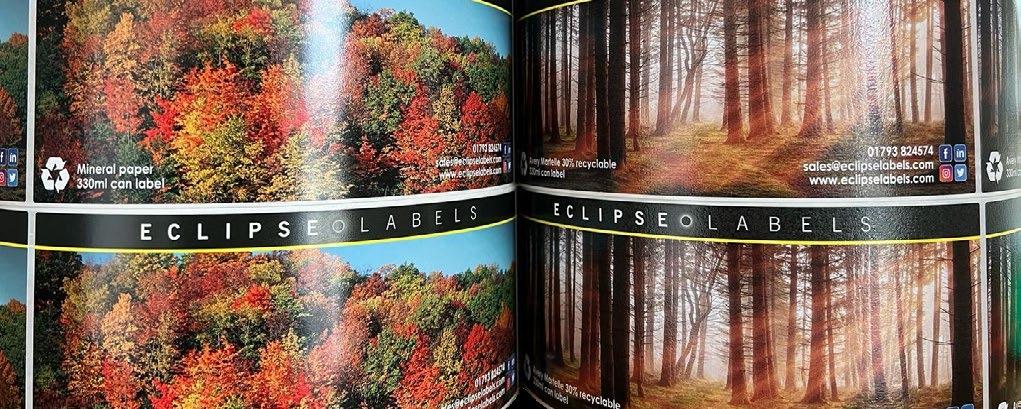
The craft brewing industry is, like every manufacturing sector facing sustainability challenges, driven by customers and retailers alike. Everybody needs to be seen to be doing their bit.
One of the most significant challenges is the carbon footprint of beer production, which contributes to climate change and, to address this issue, some breweries are taking action to improve their sustainability credentials.
There are the well-worn traditional routes to reduce your footprint, like power consumption, water usage, electric
vehicles etc but not everyone considers label usage to be somewhere they can look to reduce carbon.
With beer temperature as close to zero degrees as possible and cans, or bottles at room temperature a lot of condensation accumulates during the filling process. It’s a tough test for adhesives and print alike and, generally paper just won’t do the job, although there is one exception but not advisable without the most rigorous testing. Certain types of ink can chip when cold and wet, not ideal for a drink that we all love to drink cold!
Due to these super wet, and cold conditions many label printers need to apply a laminate to protect print, effectively doubling up on the carbon footprint for the label! With all these challenges, labels are often overlooked. 10 years ago eco label options were expensive, with huge MOQs and ridiculous lead times…not now, its very achievable!
We can supply the most sustainable options for cans and bottles with a range of eco materials, printed with durable inks that don’t need a laminate and, that work on your filling lines. There are PP materials made from Post Consumer Recycled (PCR) plastics, the stuff that’s collected from your doorstep. There’s even an Ocean friendly PP, made from PCR plastics collected from
recycling centres near the coast. The most popular, at the moment, is a PP that is made from the by-products of wood and paper pulping meaning, no new fossil fuels are used to manufacture it. This material can cut your carbon footprint on label usage by almost 50%. Through our supplier, we can input your current material and how many cans/ bottles you use annually and give you a carbon saving figure in KGs and what that equates to in terms your customers could understand.
For example, one of our customers saved the equivalent of driving a car 5,300km, the material also used 7% less water, and 1% less power than it takes to manufacture a standard PP material.
Additional to the PP range, we have a material that is classified as a paper, not a plastic and made from 80% rock dust. It has a small amount of PE resin to bond the dust together and is quite a hardy material and used under quite harsh conditions. It prints really well, feels different and very premium and is a great story for your brand. We have several customers using it, and fits in really nicely into the range of eco offerings. All these materials are available on white or clear (clear not available on the rock dust material, unsurprisingly), print quality, and performance on application is as good as the standard material. If you would like to find out more see details at the bottom.
INSTEAD OF SIMPLY LOOKING AT PACKAGING AS A BUSINESS NECESSITY, EXPLORE THE PROFOUND IMPACT THAT PURPOSEFUL AND CREATIVE PACKAGING CAN HAVE ON YOUR TARGET AUDIENCE, RECOGNISING ITS POTENTIAL TO LEAVE A LASTING AND MEANINGFUL IMPRESSION, EXPLAIN SMURFIT KAPPA.
There is a common misconception that all packaging is wasteful and damaging to the environment, with 57% of consumers less likely to buy products that are placed in harmful packaging (Cision). However, this isn’t always the case.
Though there are certainly some culprits in eCommerce with less-than-desirable delivery boxes, including those that can’t be recycled, it’s perfectly possible to find packaging your customers will rave about.
With planet friendly packaging solutions that are fit-for-purpose and offer product protection, it’s possible to help your consumers fall back in love with packaging.
Below, we’ll guide you through the process of transforming your packaging
into an environmentally friendly, integral, and efficacious part of your customers’ experience of buying from your business.
It’s no secret that packaging concerns are buzzing among consumers, especially surrounding the environmental impact and waste that packaging can cause. For example, the use of plastics is a hot topic currently, with the UN Environment Program reporting that 36% of all plastic produced is for single-use purposes, and the OECD outlining that despite recycling efforts, only 9% of plastic waste has been recycled globally, with the remaining 79% going to landfills and the natural environment, and 12% being incinerated. Many consumers are aware of the impact of single-use plastics on the environment which has led to sustainability continuing to steal the show, going beyond a consumer trend and instead being an expectation of responsible brands. In fact, a whopping 75% of consumers are more likely to purchase brands that offer green or sustainable products, and 49% said they would pay more for sustainable packaging and delivery (Deloitte).
But that’s not all, instances of damaged products also pose a major problem and can negatively impact a customer’s experience with your brand, altering their overall perception.
An overwhelming 73% of consumers would be unlikely to purchase from a company again after receiving a damaged item (Packaging News), and 1 in 3 consumers would leave a brand they love after one bad experience, while 92% would completely abandon a company after two or three negative interactions (PWC).
Without adequate product protection, damaged products are likely to be returned or even discarded before they’re used, resulting in unnecessary waste, leaving consumers feeling frustrated and disgruntled with your business.
By using planet friendly packaging materials, your business can align with changing consumer attitudes and ethical considerations.
It goes hand in hand with the expectation for green packaging and shows that your business is committed to building a greener future and ultimately cares about customer views, which in turn helps to build trust and boost loyalty.
Building trust with your customer base through aligning your values is important as we know that 88% of consumers who trust a brand will buy again (Deloitte) and UK consumers are reportedly willing to spend 44% more on average with retailers they trust (Retail Insights Network).
Packaging designed with the environment in mind makes it possible to not only meet consumer wants and needs, but also actively contributes to
75% of consumers are more likely to purchase brands that offer green or sustainable products, and 49% said they would pay more for sustainable packaging and delivery,” Smurfit
reducing the environmental impact of packaging waste and acting as a growth catalyst for businesses.
Take a look at how we worked with Sutherlands of Portsoy to create 100% recyclable packaging that removed the need for Expanded Polystyrene (EPS), whilst still providing the best product protection and the required insulation qualities here.
From biodegradable plastics to recyclable and compostable packaging, embracing these ecological solutions highlights your business’ step towards building a more eco-conscious and responsible packaging industry customers will thank you for.
True fit-for-purpose packaging goes beyond simply looking the part; it must also be practical and created with consumers in mind.
Packaging solutions designed to be accessible - for example, incorporating easy-to-open options creates accessible packaging - cater to the diverse needs of consumers, giving everyone a straightforward unboxing experience.
62% of Gen Z believe increased diversity is good for society and empathy and accountability are highly regarded by this group (Pew Research Centre), with 80% saying it’s important for brands to embrace diversity and inclusion (Hooley Brown).
Fit-for-purpose packaging should also facilitate easy product returns via eCommerce mailing boxes, which helps to create a seamless and enjoyable customer experience that they are more likely to share on social media.
And with 82% of people trusting social networks to guide purchasing decisions, what buyers say about your business online really matters (Digital Marketing Institute)
Packaging that’s tailored to the product’s needs not only minimises the chances of damage during shipping
but also effectively contributes to waste reduction and enhances overall customer satisfaction.
Prioritising the functionality and aesthetics of packaging allows businesses to optimise the entire consumer experience, even when handling returns.
When designed thoughtfully, packaging becomes a powerful tool for creating emotional connections between consumers and brands.
It enhances the visual appeal of a product and also reinforces the idea that the product was crafted with love.
Take the ‘Packed By’ stickers that Lush uses, which make customers feel as though much care and attention has gone into packing their order. It’s harder for customers to fall out of love with a brand when they feel a genuine connection to your story.
The psychological impact of packaging design is impressive. Colours, shapes, and images all stir up emotions, creating a unique and memorable experience. Using strategic colours and shapes makes packaging a key part of the product experience, shaping consumer
perceptions, and creating a sense of attachment.
Iconic examples such as Tiffany’s blue boxes or Toblerone’s distinctive pyramid shape are good examples of how powerful packaging can be when strengthening brand loyalty and making brands instantly recognisable.
For example, with the incorporation of their musical heritage with a vinyl player featured on their boxes, Dalston’s Soda were able to establish and reinforce their brand awareness – take a look here.
Emotional connections aren’t just there for the big players in the market – smaller brands can make just as much impact on their customers using these methods.
In today’s digital world, packaging is not just a functional and protective way to manage products; it’s an essential touch point to engage and connect with consumers online.
When customers are impressed by the packaging, they’re more likely to spread the word on social media, become repeat buyers and even advocates for your business.
Packaging is a big part of attracting customers, but it’s an even bigger part of retaining them.
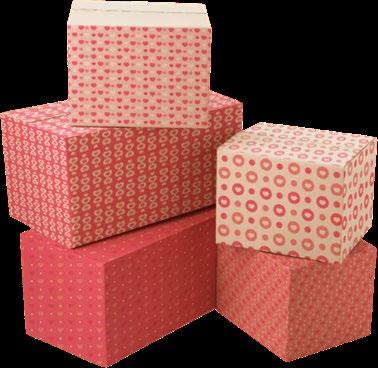
Close to 50% of a business’s revenue comes from approximately 8% of its most loyal customers, which shows just how important it is to ensure the satisfaction of an existing customer base (LinkedIn).
Plus, a 5% increase in customer retention can increase a business’s revenue by around 25%, further highlighting just how much impact holding on to customers can have on a business (LinkedIn).
Packaging extends the brand experience beyond the initial purchase, taking the brand, it’s ethos and story into customers’ homes. Consistent and high-
quality packaging can reinforce brand values and build trust over time as customers know what to expect and look forward to from a brand.
This is boosted even further by smart packaging, and personalised and exclusive packaging designs - such as limited-edition designs, personalised messages, and loyalty rewards - which make customers feel valued, further encouraging repeat purchases.
In a recent survey, over half of brands
This is especially true with iconic packaging designs, like, Pringles tubes and those memorable cereal boxes from your childhood that evoke fond memories.
It was found that 40% of global consumers have sought out products and flavours that remind them of the past and simpler times over this past year (FMCG Guru’s).
This suggests that the value of sentiment is on the rise and these packaging choices are effective because they evoke
As you can see, the transformative influence of thoughtful, sustainable, and emotionally engaging packaging can truly transform the consumer experience. This paradigm shift not only rekindles their appreciation for packaging but also cultivates brand loyalty.
Instead of simply looking at packaging as a business necessity, explore the profound impact that purposeful and creative packaging can have on your target audience, recognising its potential to leave a lasting and meaningful

key features
salsa Plus Beer accreditation
Contract brew & package into bottle, can, cask, keg, mini keg & KeyKeg
Cask rack into 9G Firkins or 18G Kilderkins
Capacity of 60,000hl/year
sterile filtration for product stability
Consistency, quality & semi - automation
Soil association accredited for packaging of organic products


Renegade is one of the UK’s leading contract brew & pack providers With a state-of-the-art brewery and packaging line, and the ability to brew ale and lager in 60-240hl batches, we could be your perfect partner
Jack Wilson, GM, Lion


We offer a wide range of formats including cask, keg, cans, bottles, 5L mini kegs and KeyKegs You can choose from reduced plastic shrink-wrap and tray or fridge packs to suit your needs and tho se of your customers
For more information please contact us on 01635 767090 or email sales@renegadebrewery.co.uk
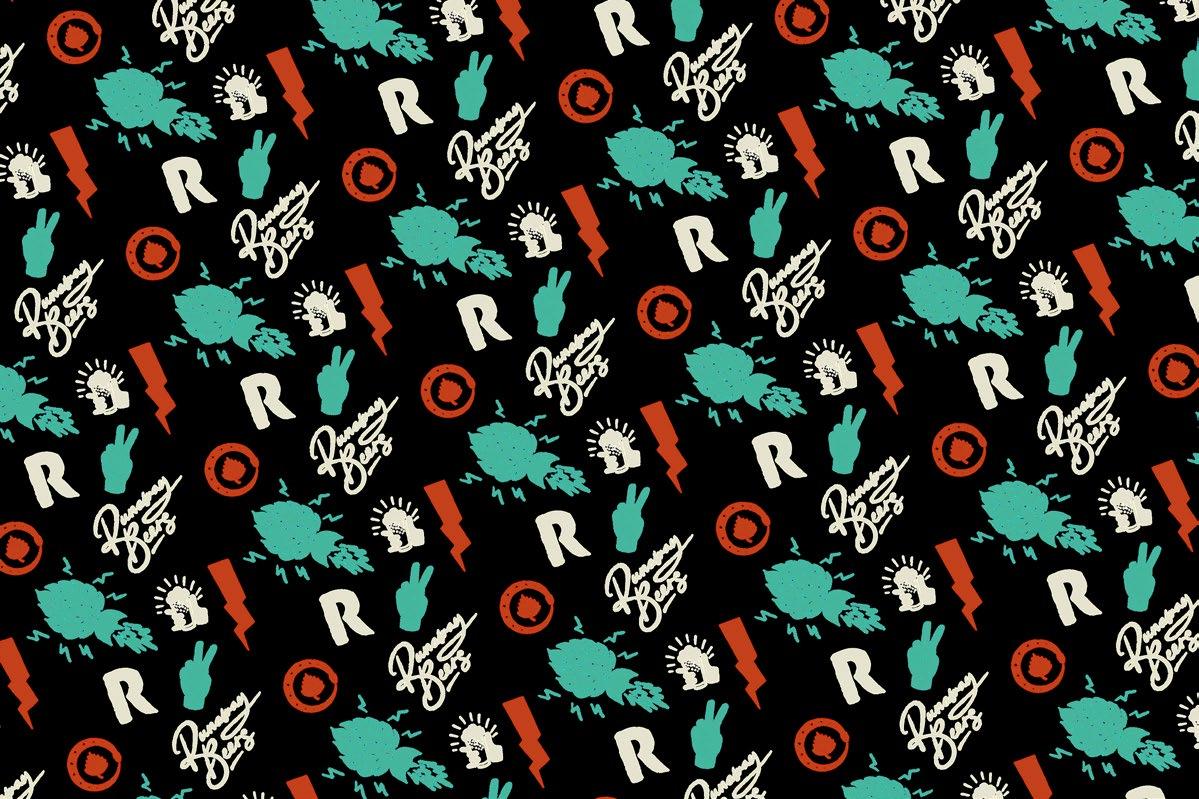
In the heart of the UK brewing industry, where craft beer trends, economic challenges, and the importance of sustainability converge, the choice between recyclable paper pint cups and conventional plastic pints has emerged as a focal and challenging decision of breweries and pubs across the nation. Navigating the complicated landscape of the brewing business, the industry finds itself at the crossroads of economic constraints and the pressing need to embrace sustainability.
The conventional wisdom suggests that sustainable alternatives, such as recyclable paper pint cups, often come with a higher initial cost compared to their mass-produced plastic counterparts from overseas.
However, viewing this cost rise as a short-term challenge obscures the broader, long-term benefits that sustainable choices bring to both the environment and the economy of the industry.
As the brewing landscape evolves, the arrival of Environmental, Social, and Governance (ESG) regulations in 2024 signals a shift.
No longer a mere option, embracing ESG principles becomes a mandate for the larger breweries operating in the EU, transforming the sustainability conversation from a desirable aspiration to a business imperative.
For breweries, this translates into more than just ticking regulatory boxes; it signifies a commitment to responsible business practices, having to record details such as carbon footprint and climate impact.
They present an opportunity for breweries to position themselves as industry leaders in sustainability. Compliance with these standards not only safeguards the future of the brewing business but also aligns it with the broader global movement towards environmentally conscious practices. Breweries that proactively adopt sustainable alternatives, like UKmanufactured, recyclable paper pint cups, are not just meeting regulatory requirements; they are setting an example for the entire industry.
Yet, the transition to recyclable paper pint cups is not without its challenges, particularly when it comes to consumer perceptions.
The familiar sight of transparent plastic pints has become ingrained in the cultural fabric of beer consumption. Adapting to change requires a delicate balance of education and innovation.
This is where the versatility of customisable, fully brandable paper cups emerges as a strategic tool, offering a bridge between tradition and sustainability.
Then there is the economic argument for sustainability and this is varied. Beyond the initial cost, breweries need to consider the long-term gains in customer loyalty and brand reputation.
In an era where consumers increasingly scrutinise the ethical practices of businesses, aligning with sustainable choices becomes a powerful unique selling point (USP).
The recyclable paper pint cup isn’t just a vessel for beer; it becomes a physical expression of the brewery’s commitment to environmental stewardship and responsible consumption.
Addressing consumer hesitancy is a process that involves understanding and respecting long-established preferences while gently nudging towards sustainable alternatives.
The key lies in conveying the advantages of recyclable paper pint cups – their biodegradability, compostability, UK-based manufacturing, and full brandability.
Customisable paper cups can be a canvas for creative branding, offering breweries a unique opportunity to engage consumers in the sustainability conversation while retaining the essence of the pub experience.
In conclusion, the move towards sustainability in the UK brewing industry, particularly in the choice between recyclable paper pint cups and reusable plastic pints, is not just a response to regulatory changes; it is a strategic decision that shapes the industry’s destination.
The initial cost considerations pale in comparison to the long-term benefits for the environment, the economy, and the brewery’s reputation.
As ESG regulations come into force, the brewing industry has a chance to redefine its narrative, emerging not only as a custodian of beer culture but also as a responsible contributor to a sustainable future.
So, here’s to brewing sustainably in 2024 and beyond – a toast to a greener, more responsible pint.
BY MAKING MORE INFORMED DECISIONS THROUGHOUT THE PRODUCT LIFECYCLE AND SUPPLY CHAIN, WE CAN REDUCE OUR SECTOR CARBON FOOTPRINT, CONTRIBUTING TO A MORE SUSTAINABLE
Scope 3 carbon emissions (CO2e) typically account for ~85% of a brewery footprint and ~70% of a hospitality venue footprint. The Scope 3 category captures the up and down stream indirect emissions such as waste, travel, energy, investments, leased and owned assets.
The carbon footprint of a product or service can vary significantly depending on multiple factors throughout its lifecycle ranging from raw materials, manufacturing processes, transportation, use and end of life management.
Whilst kegs and casks might look very similar, their carbon footprint might look very different over their lifespan. Losses, damages, idle time, end of life disposal, route to market and collections are just a handful of specific items that impact the CO2e that gets passed between breweries, bars and even consumers.
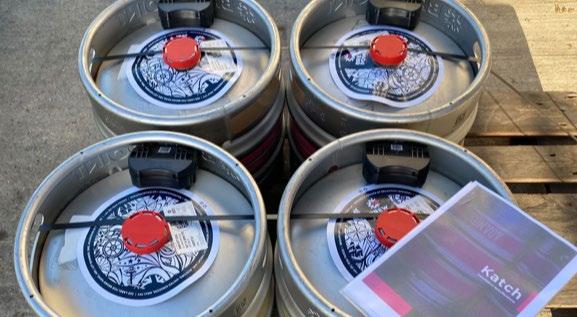
The Corporate Sustainability Reporting Directive (CSRD) will soon be upon us, requiring companies to report on the impact of activities on the environment and society, and requires the audit (assurance) of reported information.
All these activities combine to impact the carbon footprint of a pint. Like calories being labelled on menus, it’s possible that consumers will also want to know the carbon footprint of the pint in their hand, which will vary dramatically. With some simple workings using UK government published footprint statistics for a keg alone; a 30-litre keg that lasts 30 years and turns 90 times could have a CO2e that is 5 times smaller than a keg having to be replaced after 15 years and only achieving 60 turns. That’s all before considering the impact of activities such as logistics, waste, and ullage etc.
Nothing can be optimised until it can be seen, and optimisation isn’t that sexy until you measure its impact on your economic, environmental and experiential targets. Konvoy’s edge IoT (Internet of Things) keg and cask tracking device (Katch) and Cloud platform enables greater efficiency, effectiveness, quality, circularity and sustainability from producer to venue and back again.
By recording location, temperature and motion data every 10 minutes and reporting every 12 hours, brewers and fleet operators really can see in real-time what needs to be optimised.
With more than 130,000 tracking devices on our own fleet, Konvoy’s tracking device and Cloud based technology has been deployed on more than just kegs and casks across brewery operations with tracking devices used within mobile event equipment, along with other up and downstream products in consideration from transportation of yeast, hops, retail roll cages and CO2 shipments.
Within the brewing sector, the team are delighted to have begun tracking journey’s with Brewpoint, Titanic Brewery, Salopian Brewing Co., Lost & Grounded, Barney’s Beer, Brasserie du Mont Blanc (to name a few) and a steadily growing number of high-profile brewers, suppliers, wholesalers, cold chain operators and retailers.
By making more informed decisions throughout the product lifecycle and supply chain, we can reduce our sector carbon footprint, contributing to a more sustainable future and an even better world of beer.
Why does sustainability matter in the brewing world?
Just like a carefully brewed beer relies on quality ingredients, the merchandise that represents your brand should echo the same dedication to excellence. Breweries have a unique opportunity to not only share their craft but also to champion eco-friendly practices. From brewery staff uniforms to promotional giveaways, each piece can tell a story of sustainability.
We take pride in crafting not only quality merchandise but also in doing so with a commitment to sustainability.
As purveyors of screen-printed and embroidered merchandise, ranging from T-shirts and sweats to hoodies, tote bags, caps, and hats, it’s important understand the significance of leaving a positive imprint on both the environment and the communities we serve. Our ethos revolves around creating products that resonate with the values of the breweries we partner with.
At the heart of our offerings is the renowned Stanley/Stella brand – an embodiment of sustainable fashion that aligns seamlessly with the conscientious spirit of the brewing community. We are honored to be recognized as award-winning dealers of Stanley/ Stella, a brand synonymous with ethical practices, organic materials, and a commitment to minimizing environmental impact.
But our commitment to sustainability goes beyond a single brand. We curate a diverse range of ethical and organic cotton brands and styles, ensuring

that our clients have access to a spectrum of choices that reflect their own commitment to environmental responsibility.
When it comes to merchandise, you can set yourselves apart in a number of ways. By using eco-friendly materials merchandise is crafted from organic cotton and other sustainable materials, reducing the environmental footprint associated with traditional manufacturing.
Relying on fair and ethical production: We uphold fair labor practices, ensuring that the individuals crafting your merchandise are treated with respect and compensated fairly for their work. We’ve been an accredited Living Wage Employer for many years now.
Customization with a Conscience is another point to consider. Beyond just delivering high-quality products, we provide customization options that align with your brewery’s commitment to sustainability, from water-based inks to
eco-friendly packaging.
Durable and Timeless Decoration is another. Our focus on quality extends to the durability and timelessness of our prints and stitches, ensuring that your merchandise lasts longer, reducing the need for frequent replacements.
We believe in more than just providing merchandise; we aim to be partners in promoting a sustainable ethos within the brewing community. Let us help you amplify your brand’s commitment to quality and sustainability through merchandise that stands the test of time. Cheers to a future where every sip and every stitch tells a story of craftsmanship, dedication, and a shared commitment to a sustainable world.
PACKAGING, AS WE ALL KNOW, IS AN INTEGRAL PART OF A BEER’S JOURNEY. HERE MARK BANKS OF SEB BREWING & PACKAGING OUTLINES THE STRIDES THEY’RE TAKING TO ENSURE THEY CAN BECOME THE MOST SUSTAINABLE DRINKS PACKAGER IN THE UK
Following successful feasibility trials at GADDS’ Ramsgate Brewery, SEB Brewing & Packaging is pushing ahead with the installation of a full CO2 recovery system. The technology is designed to capture the CO2 generated by the brewery fermentations, clean, compress and liquify it, rendering it fit for use in carbonating beers and running the filling machines. The results from the feasibility study show the process to be robust, producing liquid CO2 of unparalleled purity, with measured oxygen content of below 15 parts per billion (our wholesale supplied CO2 is around 30 ppb).
The project fits into a wider initiative to hit net zero on site by 2030 and is expected to make double digit reductions in emissions, giving SEB a kick start in their journey.
The company’s scope 1 emissions are primarily natural gas (used in the brewery), and CO2 evolved from fermentation, the latter making up around a third of the total. SEB’s target is to recover 75% of this evolved CO2 by the end of the year.
Stage 3 of the project is the installation of CO2 recovery systems in founder breweries, utilising existing transport routes to supply SEB with as much gas as it needs to become fully self-sufficient. In doing so, 65 tonnes a year of direct CO2 emissions will be captured and reused, and 90 tonnes will be removed from the wholesale market.
CO2 capture technology has been used in the brewing industry for over 40 years at breweries producing over 150,000 HL a year.
It’s only in the past year that this technology has been scaled down to be fit for use by craft brewers, and SEB (with GADDS’) is the first company in the UK to take the plunge.
Alongside CO2 capture, SEB is looking at other ways to reduce their environmental impact including a reduction in chemical usage.
Brewery and packaging cleaning cycles traditionally employ caustic based chemicals diluted in very hot water. With enough heat, and enough chemical action, soil (mainly proteins and starches) is loosened and then removed from surfaces, leaving them ready for sanitation.
The heat and the chemical use is an expensive drain on resources, and the processes must be carried out with great care to avoid personal injury. The used fluid must then be neutralised prior to discharge.
However, recent innovations in enzyme technology is on the verge of revolutionising cleaning in the brewing industry, and SEB is positioning itself in the vanguard, helping suppliers trial new products.
Enzymes have the potential to be used multiple times over, at ambient temperatures, and represent no risk to personnel, product, or the environment. Trials so far have shown the technology to be very promising and the aim is to replace all caustic on site with enzymes during Q2.
Significant challenges are likely along SEB’s journeys towards net zero, but the company is making early (and serious) headway, building problem solving skills and momentum by backing technological solutions only newly available to the industry. The direction of travel is set for all of us, and SEB is happy to take the lead.
IN THE BREWING INDUSTRY, SUSTAINABILITY HAS EVOLVED FROM BEING AN OPTIONAL INGREDIENT TO A VITAL PART OF THE RECIPE. BREWERS AROUND THE WORLD HAVE BEEN FERMENTING SIGNIFICANT CHANGES TOWARDS ENVIRONMENTAL SUSTAINABILITY, AND A KEY AREA WHERE TRANSFORMATION IS BUBBLING UP IS IN THE CHOICE OF PACKAGING, EXPLAIN THE TEAM AT PAKTECH.

Environmentally conscious breweries have many goals when it comes to their packaging demands and our unique approach to secondary packaging aligns perfectly with those.
With 100% recycled and 100% recyclable handles, we present an opportunity for breweries to significantly reduce their environmental footprint while enhancing consumer experience with eye-catching designs.
At the heart of our sustainability ethos is the circular economy model. Every handle is manufactured from 100% recycled High-Density Polyethylene (HDPE), sourced from everyday household items like milk jugs and juice containers. This significantly reduces greenhouse gas emissions, drastically cuts down on energy use, and eliminates the need for virgin petroleum compared to conventional plastic production. The handles, used by breweries just like yours, have given over one billion milk jugs a new lease of life. They’ve also saved more than 52 acres of land from
turning into landfill waste and kept over 135 million pounds of plastic out of our landfills and oceans. What’s more, the handles themselves are designed to be repurposed and recycled. In 2020, we introduced Pak to Pak handles that are made from recycled our handles, making them third-life products that embody the closed loop cycle. This ensures our handles live on, long after your last sip of beer.
Our commitment to sustainability doesn’t stop at recycling. Our operations are designed to be as energy-efficient as possible.
A whopping 80% of the energy used at our production facility in Eugene, Oregon, comes from hydroelectric energy, a renewable form of energy that harnesses the power of moving water to generate electricity. And the lightweight and compact design of our handles makes them easier to transport, reducing carbon emissions as they make their way to you. For breweries keen to enhance their sustainability efforts, teaming up with
PakTech can be the secret ingredient. By choosing our recycled and recyclable handles, you’re not just reducing packaging waste, you’re making a bold statement about your commitment to sustainability.
But this commitment to sustainability goes beyond our handles. In 2023, we partnered with BrauKon to bring our smart and sustainable solutions to the European market.
Together with the renowned German supplier and manufacturer of brewery systems, we launched our first automated applicator in Europe. The innovative handle applicator, known as the CCA 120/180, is tailored to meet the unique needs of European breweries. This high-performance machine seamlessly applies our ecofriendly handles to cans, significantly increasing packaging efficiency. The handle applicator is set to revolutionise packaging processes, saving both time and resources while maintaining our
commitment to sustainability. In North America, we run a recycling program that works with over 800 businesses to ensure that as many of our handles as possible are recycled. We are also a founding member of the US Plastics Pact, pushing for industrywide collaboration to tackle plastic use. And to help make your decision even easier, we’ve developed the PakCheck - a checklist to help you choose the right sustainable packaging for your organisation. This comprehensive checklist guides breweries in making informed decisions about your packaging choices.
By adhering to this, you can make sure you select packaging that minimises greenhouse gas emissions, promotes recycling and reusability, and optimises resource use. With our commitment to 100% recycled materials, recyclability, and energy-efficient operations, our handles meet all these criteria, offering breweries a best-in-class solution for sustainable secondary packaging.
As brewers, you strive to brew better beers. Let’s also pour our effort into brewing a sustainable future too. By choosing eco-friendly packaging like our handles, breweries can play a crucial role in driving the shift toward a more sustainable and energy-efficient future. It’s not just about making great beer; it’s about doing so in a way that respects our planet.
With PakTech, breweries have a partner that can help you achieve your sustainability goals while continuing to deliver exceptional experiences for your customers. Let’s cheers to that!


WHILE MANY
ARE DISCOVERING THE BENEFITS OF SOLAR POWER FOR THE FIRST TIME, A FEW EARLY ADOPTERS ARE ALREADY DOUBLING DOWN ON THEIR INVESTMENT,
When Wiper & True moved into new Bristol premises in 2021, they installed 40 kW of rooftop solar panels as part of the building’s refurbishment. Last year they extended
this system to four times its original size. Renewable energy specialists CleanEarth were behind both installations, and their commercial manager, Ed Lennon, explains why Wiper & True followed up so decisively on their initial investment.
“Compared with the scale of their brewing operation, the first project was modest in size,” says Ed. “This was deliberate, in part because they already had some big capital commitments with the move to new premises. But also because it gave them the chance to see some real-world results before scaling up.”
For every project, CleanEarth model the system’s output over time, mapping this to the energy demand on-site and forecasting the payback period and return on the capital investment. It’s a robust model which has been refined across more than a thousand installations. But actual results make a more compelling argument than paper forecasts!
For Wiper & True, it quickly became clear that their initial foray into solar generation
was handily meeting expectations. As their brewing output was also growingand their energy demands with it - it was an easy decision to go larger on the solar array.
“It didn’t take long for the benefits to be proven,” says Ed Lennon, “and the extended system has earned its place since day one.”
Now totalling 160 kW, Wiper & True’s solar panels will save them around £1.7m over the system’s lifetime, paying back the investment in well under five years. It will also save more than 700 tonnes in carbon emissions, which was also a large part of their motivation in going the renewables route (see case study).
Shropshire’s Ludlow Brewing Co started their solar journey a couple of years earlier than their Bristolian counterparts. CleanEarth installed 36 kW of panels in 2021, extending it a year later to nearly double that.
As Gary Walters, Ludlow Brewing Co’s managing director says, “solar power

is the cornerstone of our sustainability strategy.” And that’s why they doubled it again in 2023, bringing their installed capacity to 120 kW.
The advantages were clear to Gary Walters: “this has been instrumental in future-proofing the brewery’s energy infrastructure, to help us create longterm operational efficiency and reduce emissions and costs.”
According to CleanEarth’s Ed Lennon, Ludlow Brewing Co and Wiper & True are far from being outliers in their incremental approach. “A growing proportion of our work is for companies who have put a toe in the water, seen that solar works for them, and come back for more.”
Of course, the staged approach isn’t the only way to tackle self-generation. If the circumstances are right, there’s no reason not to commit fully from the outset.
Keltek Brewery in Redruth, Cornwall, recently did exactly that when they went for a 122 kW system right off the bat.
As they embarked on a major refurbishment of their premises, they made reducing their carbon footprint
a key priority. CleanEarth designed a system that used all the available roofspace across three conjoined buildings. As Ed Lennon says, “we really couldn’t have squeezed in any more.”
Stewart Cawte, Keltek Brewery’s managing director, believes that making a full-scale installation part of the refurbishment was a good move. “CleanEarth worked well with the other trades on-site,” he says. “They made it easy for us to understand, and the whole process was painless and very supportive.”
He is also delighted that the brewery’s investment will save 600 tonnes in carbon emissions over its lifetime, along with £450,000 in energy bills, providing payback in under four years.
There is no single “right” way to approach an investment in solar generation. Every case is different and all the variables need to be addressed - from energy consumption to hours of sunshine, from available capital to accessible roof-space.
Wiper and True are on a mission to reach Net Zero by 2030, and solar generation is central to their decarbonisation plans.
In addition to their 160 kW solar installation, Wiper & True’s Net Zero pathway has seen them deploy specialist technology that captures the carbon dioxide produced as their beer ferments. Instead of being released into the atmosphere the CO2 is cleaned, stored and used elsewhere in the brewing process, creating a closed loop.
They also do all their local deliveries by electric van, make their labels from cornstarch instead of plastic, and use 100% FSC-certified cardboard in their packaging.
As one of the UK’s first brewers to employ a dedicated Sustainability Manager, Wiper & True’s commitment to the environment is clear.
In some cases a “once and done” approach makes most sense, in others there may be compelling reasons to take things step-by-step.
Ed Lennon believes the key is to keep focused on the needs of the business. “Every project has its own unique set of conditions,” he says. “My job is to work out which solution will provide the best commercial and environmental outcomes in the long-term.” Ultimately it’s all about saving money and saving carbon. If breweries are investing for a second or third time in solar power, that shows it can do both.
CleanEarth operate throughout the UK from their HQ in Cornwall. They have been developing solar and wind projects for businesses large and small since 2010. Their renewable installations in the brewing sector include Budweiser Brewing Group, Goodh Brewing Co, Left Handed Giant, Moor Beer, Verdant Brewing Co - as well as the above-mentioned Keltek Brewery, Ludlow Brewing Co and Wiper & True.
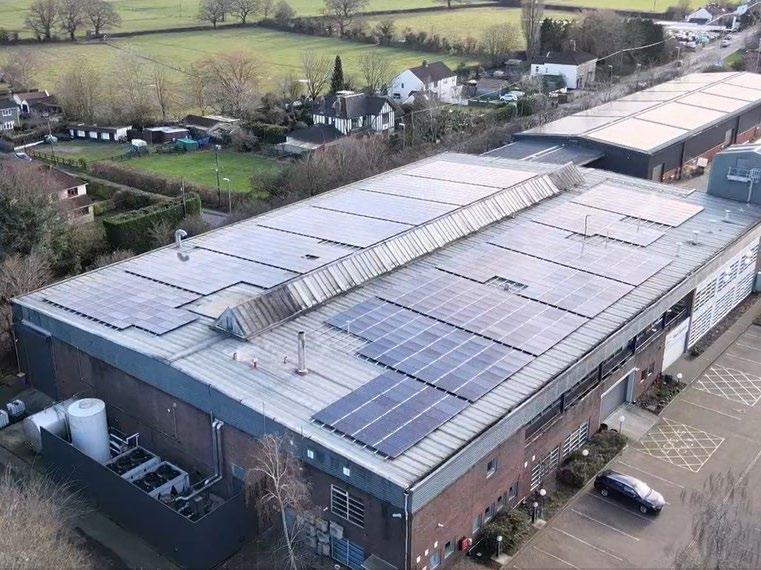
HARE BREWERY, NEAR BRISTOL, HAS INSTALLED HUNDREDS MORE SOLAR PANELS ON ITS ROOF WITH THE AIM OF USING AS MUCH RENEWABLE ENERGY AS POSSIBLE TO FUEL ITS BEER PRODUCTION.
Hare Brewery, which is owned by St Austell Brewery, has installed a wealth of new solar panels on its roof. Why?
With the aim of using as much renewable energy as possible to fuel its beer production.
The business will now be able to generate an additional 230,511kWh electricity per year. This added to the energy the existing solar panels at the site generate is the equivalent of powering around 150 homes.
The new solar array which takes up the entire roof space of the brewery’s distribution centre in Warmley was installed by ZLC Energy Limited.
The Cornwall-based company is also responsible for the solar arrays at St Austell Brewery’s head office and Cornwall Distribution Centre in St Columb, as well as the 892 solar panels previously installed on Hare Brewery.
The 608 new solar panels add to St Austell Brewery’s efforts to champion sustainability and reach its net zero goals. During the summer months, Hare Brewery is expected to be able to brew its beer and operate on the energy the panels produce, with the system designed so that almost 100% of the generated power will be consumed on site. In the winter the site will draw a minimal amount of electric from the grid. It’s estimated that the arrays will save a
huge 50,000kg of CO2 per year – which equates to 85.5 passengers’ roundtrip flights to Munich.
Elle Sambrook, St Austell Brewery’s Head of Sustainability, said: “This is a really big step towards our net zero plans to eliminate our avoidable emissions.
“We set ourselves an additional goal to increase our on-site green energy and reach 50% energy consumption from renewables across all sites by 2030.
“These solar panels are a big part of making that goal a reality and we are already at 40% onsite generation at Hare Brewery with this installation.”
ZLC’s Managing Director, Matthew Shepherd, added: “We are proud to have worked with St Austell brewery since 2012 to support them in working towards their sustainability goals. St Austell Brewery is a great customer to work with and there is nothing better to celebrate
the completed install with than a cold pint of Tribute.”
As part of the brewery’s overall sustainability aims, Will Hartley, Production Manager for Hare Brewery, has also been leading on brewing beer with less energy.
He said: “Our teams are focused on several different improvement projects to reduce our energy consumption and waste.
“The method with the biggest impact is likely to be optimising our boil evaporation; effectively we will use less steam to achieve our boil. This will mean we reduce the amount of natural gas we use to make our beer.”
These solar panels are a big part of making that goal a reality and we are already at 40% onsite generation at Hare Brewery with this installation, Elle Sambrook




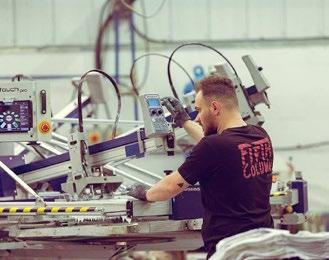
Over the last 12 to 18 months we have been developing and implementing new process enhancements to improve customers efficiencies, increase production volumes and reduce water wastage.
Examples of these enhancements have been successfully installed and proven at breweries such as Track Brewery Co, BlackJack Brewing Co, Two Flints Brewery, The Five Points Brewing Company, BeerCraft and Brixton Brewery.
Our environmentally friendly water saving condensers for hot water tanks and kettles eliminate odours, eliminate room condensation and the possibility of mould build up, in addition to reducing water usage over conventional condensers.
Condensers can be easily integrated into existing brewery systems with minimal down time and installation impact.
To increase production batch volumes at The Five Points Brewery Company and to save on the expense of a new tank we removed their existing 20-barrel kettle

from the brewery, transported it to our offices and workshop in Peterborough and added 30% extra capacity by cutting the top off the kettle and hygienically welding a new pre-fabricated top section with extended shell height.
In addition to this upgrade, we also replaced their existing mash tun rake by installing our new combined bidirectional mash mixer/spent grain removal triad to the base of the tank.
This modification reduces the mash out time by more than 33% and reduces the mash tun cleaning time.
Gravity Systems were also a key part of the recently installed Co2 recovery system at Brixton Brewery.
Our brief was to work with Brixton Brewery and Dalum to design and install their services requirements. Brixton Brewery were aiming to reduce their carbon footprint and improve their wider environmental impact.
They therefore invested in a Dalum Co2 recovery unit the first of its kind in London, which captures the CO2 produced in the brewing process and allows them to reuse it in other parts of the process. They estimate that this will provide up to 70% of their C02 needs meaning they purchase and transport less CO2 and crucially emit far less.
Gravity Systems was formed to meet the growing demand in the craft beer market for a single source for all brewhouse, fermentation, services generation and distribution. It was formed by Tony Barnett and Martin Smith, two experienced engineers who have over many years gained a wealth of knowledge in the brewery, beverage and food industries which enables them to understand and appreciate the technical and business issues breweries are faced with, whether an extension, upgrade or a complete new brewery.
WATER IS INTEGRAL TO THE BREWING PROCESS BUT BREWING IS ALSO INCREDIBLY WATERINTENSIVE. SO WE MUST DO ALL WE CAN TO MINIMISE OUR WATER CONSUMPTION WHEN MAKING OUR BEERS, EXPLAINS SØREN NØHR BAK, SENIOR EXPERTISE DIRECTOR AT NIRAS
Water is not only critical for our survival — it’s key to the success of economies too.
What was once a plentiful commodity is now increasingly recognised as something that needs to be preserved both for the environment and to avoid the high cost of wastewater disposal. As many as three out of four jobs are either heavily or moderately dependent on water, according to the UN, so any droughts or restrictions on supply will impact a company’s success and a nation’s prosperity too.
Brewing, as mentioned previously, is water-intensive and, whereas CO2e emissions are a global concern, there are local differences in the availability and quality of water. This not only impacts processes within a brewery but also where to locate it.
We’ve seen examples of breweries being forced to move to a new site because they couldn’t get the required water volume to produce its beers efficiently and cost-effectively. As climate change heightens the risk of water scarcity, access to water is critical to futureproofing a site.
Finally, raising awareness about the steps breweries are taking to reduce water consumption can help the public to make informed purchase choices that align with their values around sustainability. We can see evidence of manufacturers outside the brewing industry taking steps to reduce the risk of water scarcity in the areas where they operate — notably Coca-Cola via its Water Stewardship initiative.
In order to increase water efficiency, it’s helpful to apply the Four Rs framework. Reduce the amount of water consumed at a machine level, or by switching to processes that don’t use as much water. The industry has been working on ways to reuse water in other secondary processes since the 1980s — so, while there is still waste, significant progress has been made. Carlsberg halved its
water consumption with a water recycling system (see case study below). There are also examples of brewers using treated wastewater from other sources to produce beer — and it has gone down well with the public. Carlsberg also set the standard for recycling in a move that has been emulated across the industry. Now more breweries are recycling water, not just for technical purposes but for process critical elements, such as the final rinse when cleaning production equipment and packaging materials. The barrier they need to overcome is how to safely use processed wastewater while maintaining the same quality standards. Given the amount of research that has gone into brewing processes and water efficiency in recent years, there is a real opportunity to rethink traditional methods, and apply the latest scientific thinking. This has already resulted in substantial gains for some companies — such as reducing water usage. Whereas previously around 12% of water might be evaporated to remove the alcohol, it can now be as low as 1-2% thanks to improved processes.
Carlsberg Brewery in Fredericia, Denmark, is now recycling 90% of all process water and has halved its overall water usage — making it the most water- efficient production plant in the Carlsberg Group. As part of its ambition to achieve zero water waste at its breweries, Carlsberg has invested in a water recycling plant — which is reducing average water consumption at the brewery from 2.9 hl of water per hl of beer to 1.4 hl of water per hl of beer. At a global level, Carlsberg’s aim is to halve its water usage from 3,4 hectoliters to 1,7 hectoliters pr. hectoliter of beverage produced.
The plant was finished in the spring of 2021. Carlsberg opened Fredericia Brewery on September 25, 1979. NIRAS was involved in the construction of the brewery through the company DanBrew which is now part of NIRAS.

A SALFORD-BASED BREWER AND PUB RETAILER HAS ANNOUNCED A RAFT OF NEW ENVIRONMENTAL INITIATIVES WHICH WILL BE INTRODUCED ACROSS THE BUSINESS THROUGHOUT THE YEAR.
Hydes, the family-owned independent brewery which celebrated its 160th anniversary last year, has introduced numerous initiatives across different areas of the business from the brewery and head office throughout its pub estate. At the brewery in Salford, new environmental measures include the installation of state of the art inverter drives which control the speed of the motors during the constant brewing process to improve energy savings.
A steam generator has also been installed which, although only used when required such as particularly busy production periods, uses far less energy than other power sources.
The brewery has also been fully lagged with insulation material to maximise energy efficiency, LED movement sensor lights installed throughout and voltage optimisers added to use electricity at 230v allowing significant energy savings to be made.
Further additions to the brewery operation include plant automation reducing inefficiencies and downtime, EV charge points and all dray vehicles are fully solar panel battery powered.
Initiatives to be implemented throughout the year include the harvesting of rainwater inside the brewery for cask washing use and investment in an energy-efficient heat pump in the brewery for heating and cooling of the office space.
Across the pub estate, a number of Hydes’ pubs have installed LED sensor lighting and EV charging stations. A biomass boiler has been installed at the Stamford Bridge in Chester with the intention of introducing similar energyefficient boilers to more Hydes pubs. Pubs across the estate have also
committed to recycling cooking oil in kitchens and cutting wastage.
Adam Mayers, Managing Director of Hydes, commented: “We are focussed on driving energy efficiency improvements with the brewery, production areas and across all sites.
“We are acutely aware that our brewery and pubs have a significant impact on communities and the environment, therefore we must work sustainably and responsibly to ensure we can safeguard the future of our business and protect the planet.
“To help conserve energy a sustainability steering group has been created and meets regularly to review all energy efficiency and environmental practices. As well as making significant operational changes it’s also about making smaller, long-term changes to the way our business runs.
“We continue to fit LED bulbs every time one is replaced and on all refurbishments. We also ensure energy is regularly monitored so targets can be set and achieved.
Voltage optimisation and cellar compartmentalisation has also been incorporated at several sites with additional rollout planned for more pubs.”
Hydes, with its brewery in Media City, was formed in 1863 and supplies beers to wholesalers, pub companies and other brewers throughout the UK and a pub retailing estate of nearly 50 pubs across the North West of England and North Wales.
Hydes operates nearly 50 pubs ranging from Lancaster in the North to Stokeon Trent in the Midlands and across to North Wales including a wide selection of premium dining destination outlets and traditional community pubs.
IN A MANNER THAT
PRIORITISES
BOTH THE ENVIRONMENT AND LOCAL
group was powered by 100% renewable energy, Wells & Co. partnered with Osprey Energy to roll-out fast charging points at a number of major sites nationwide.
IS NO MEAN FEAT. HOWEVER, IT’S A CHALLENGE THAT WELLS & CO. AGREED TO TACKLE HEAD-ON THROUGH A CORPORATE COMMITMENT TO PROTECTING THE PLANET. THIS IS HOW THEY DID IT.
Established in 1876, Wells & Co. is an independent, family-owned pub management business based in the heart of Bedfordshire.
Overseeing around 30 managed establishments across the UK –from neighbourhood hangouts and countryside taverns, to friendly city centre stops – the company is headquartered at Brewpoint – a £14m state-of-the-art brewery specialising in small-run speciality ales and lagers. Following a period of reflection during the pandemic, Wells & Co. decided to shake up operations and embrace a completely new approach that prioritises both the company’s impact on both the natural environment and the communities surrounding it. This shift required a complete evolution of the business, but one that the team wholeheartedly supported.
Alongside renegotiating energy contracts to ensure that every establishment in the
A dedicated auditing team was also introduced, with the responsibility of analysing energy efficiency across the group, setting baselines and making strategic changes to minimise consumption.
Elsewhere, three hives with 25,000 honeybees were introduced to the Brewpoint site, with honey now on sale in the shop and also added to a new wheat lager brew.
A partnership with Too Good To Go was also struck up, which saw pubs across the group offer low-cost meals to app users rather than seeing excess wasted.
However, one of the biggest moves was collaborating with ReFood – the UK’s leading food waste recycler – to take plate scrapings, kitchen scraps and out of date produce from the company’s 30 sites nationwide, in a bid to eradicate food waste to landfill.
With extensive experience working with leading names from across the supply chain, ReFood implemented a bespoke service which has since helped Wells & Co. to revolutionise its green credentials.
With three anaerobic digestion (AD) facilities in Widnes, Doncaster and Dagenham, ReFood collects 480,000 tonnes of food and drink waste each year and recycles it to generate renewable energy and sustainable biofertiliser. With its own fleet of collection vehicles, ReFood offers an end-to-end bespoke service to suit exacting business needs. Unique in the marketplace, its ‘bin swap’ solution sees full bins collected and switched for empty, sanitised replacements. This allows food waste bins to be used directly in kitchen areas and helps businesses to separate at source.
Ed Robinson, sustainability manager at Wells & Co., commented: “During the pandemic, we decided to evaluate our existing approach. From this, it became clear that we wanted to be more proactive in our commitment to sustainability across all areas of the company. Like most hospitality businesses, food waste is a frustrating –but hard to eliminate – part of our day-today operations.
“Alongside numerous initiatives to decarbonise operations and accelerate our corporate transition towards net zero, embracing a food waste recycling service seemed like a necessity to further reduce our impact on the environment.
“Our partnership with ReFood has already had a significant impact across the business. Rather than just a service provider, we see the team as a partner. They’re committed to making recycling food waste as simple as possible for us, working around the many schedules of our partners and restaurants.”
Philip Simpson, commercial director at ReFood, added: “Our closed-loop service offers the perfect solution to tackle unavoidable food waste at any hospitality business. We work with countless pubs, restaurants, bars and ‘food to go’ establishments across the UK to reduce reliance on landfill.
“One of the most important aspects of our service, however, is the opportunity to reduce costs. Indeed, compared to paying for commercial waste disposal, our food waste recycling service avoids landfill tax rates.
“This means that many businesses can expect to achieve savings of around 50% when working with us – a win for the environment and a boost for the bottom line.
“As demonstrated by Wells & Co., the ReFood service is easy to integrate into existing operations and can have an immediate business impact. What’s more, staff need minimal training and the impacts can be measured almost immediately.”

A cold stablisation module using Parker’s Prepor NG and Bevpor BR filters at Zagrebačka
in Croatia.
THERE ARE A NUMBER OF WAYS WE CAN TURN THE TEMPERATURE DOWN ON RISING COSTS. FILTRATION TECHNOLOGY AND EXPERTISE CAN HELP BREWERIES BECOME MORE EFFICIENT, EXPLAINS MARK RICHARDSON, PROCESSING PRODUCT MANAGER AT PARKER BIOSCIENCE FILTRATION.
Rising energy costs, according to a report by Frontier Economics for the British Beer and Pub Association (BBPA), are the biggest threat to breweries’ viability. Add to that increased raw material prices and breweries are under increasing pressure to operate more efficiently.
Clearly there are no easy fixes to the threats posed by energy price rises or supply chain disruption.
But by addressing how beer is stabilised and how filtration systems are operated, significant savings are possible.
Flash pasteurisation. This is where beer is pasteurised for a short time at typically 70°C – is a common method of removing spoilage microorganisms. However, a large amount of energy is required to achieve the temperatures required for the process to run effectively. There are additional costs, too. Heating the beer will cause the CO2 to come out
of solution unless the line pressure is increased and tightly controlled. This means that booster pumps which regulate the line pressure at approximately 10–14barg are necessary to control degassing. Running these pumps requires a significant amount of electricity.
Cold stabilisation. This is the use of filtration to achieve microbially stable beer – uses less energy and is more environmentally friendly.
Heating the beer isn’t required and as long as the line pressure is maintained at approximately 1barg, there is also no requirement to run booster pumps. Cold stabilisation also enables breweries to reduce water use and beer losses. Flash pasteurisers work by passing the beer through a plate heat exchanger (PHE) at a required flow rate.
The Pasteurisation Unit (PU) level is a function of temperature and time – which
means that flowrate through the system is critical. The correct pressure also needs to be maintained to achieve the correct carbonation level and prevent degassing as the beer heats up. If these parameters fluctuate and cause the PU level to change, the process will be stopped and held in standby mode – which typically involves dumping the beer.
The beer is replaced with an equal quantity of flowing water until the problem is rectified… and this can result in huge quantities of water being used.
Cold stabilisation is a far less volatile method, as there is not such a high demand on a reliable flow rate, temperature, or pressure.
The water consumption of a cold filtration system, therefore, can be much smaller than that of a pasteurisation system. In addition, in the pasteurisation process, every time there is a batch change, the water consumption far outweighs that associated with cold stabilisation.
Ensuring that filters last longer before they need to be replaced, and reducing blockage rates, can have an impact on both consumable spend and a brewery’s productivity.
The more frequently filters need to be switched out, the more often a process will need to be put on hold. And the faster filters come to the end of their usable lives, the greater the expenditure on replacements.
Developments in membrane filtration technology have helped to address these challenges. Parker’s Bevpor BR filters, for example, feature unique, graded density PES membranes which have been engineered to resist blockages by capturing microbial contaminants without restricting flow paths. They have been developed to return the maximum lifetime and throughput to blockage, helping to reduce the operational costs of microbial stabilisation.
The optimisation of filter systems is also key. Ensuring the correct pre-filtration measures are in place, that filters are sized correctly and that they are suitable for filtering the specific product required,

are all vital considerations. Filters themselves certainly shouldn’t always get the blame for blockages. A change in process fluid (for instance water from a new municipal source) can cause filters to block more frequently if the system hasn’t been correctly optimised.
Filtering a new beer product with the same system as used on a different product can again, cause premature blocking – for example, if the ‘new’ product has an elevated protein content. Specialist expertise is required to ensure optimisation is successful: Parker’s Technical Support Group, for instance, can undertake filterability trials to optimise filtration, analyse blocked cartridges, and conduct process analysis to support brewers.
Of course, an effective Clean in Place (CIP) regime will remove and/or reduce blockage components to prolong a filter’s lifespan. Filters should be cleaned regularly to control microbial levels and they should be cleaned between product batches to prevent cross contamination. CIP will also support the sanitisation of filters by removing and/or reducing retained microorganisms to prevent microbial build-up.
Techniques for CIP include using hot water, employing a caustic wash or a peracetic acid (PAA) wash, using disinfectant or backwashing with water. The regime will vary, depending on requirements.
However CIP can be ineffective – and even cause damage and contribute to filter blockages – if the regime is not tailored correctly. Again, this can increase
spend on consumables and lead to more downtime.
Chemicals used in CIP regimes can potentially put filter integrity at risk and the high temperature required to facilitate the breakdown of blockage materials poses a risk to the filter construct too. Parker’s Technical Support Group offers guidance on the compatibility of filters with CIP regimes, and can recommend solutions that optimise CIP regimes and ensure that filter integrity is maintained. Integrity testing will also help operators to identify if a CIP regime is damaging filters… and filters should be integrity tested after CIP to ensure their integrity before processing takes place.
Our Bevcheck portable semi-automated integrity testing units and Bevcheck Plus fully automated integrity testing units have been developed to support breweries in this.
Technology and methodologies are continuing to evolve, as demand for more energy efficient solutions surges. Parker, for instance, is exploring the potential for a greater use of enzymes in CIP regimes, which can work at lower temperatures than caustic washes, thus helping breweries to reduce energy consumption.
Switching from flash pasteurisation to cold stabilisation is just one part of the journey to greater efficiency. Accessing the specialist expertise needed to optimise filtration systems and CIP regimes, and embracing innovation, are also key.
Combined, these elements can help breweries save time and money, reduce their carbon footprints, and create a more sustainable future.
In the past decade, I have revelled in this dynamic, energised and fast-paced industry as we enjoyed the rise of the so-called “Craft Beer Boom”.
During these times fads were frequent and the industry was alive with energy fuelled by experimentation, innovation and rapid growth.
Amid recent and ongoing challenges, I feel we’ve grown wiser, more deliberate and more introspective.
Our gaze once fixated on the horizon of novelty, now turns inward, honing in on the finer details of our operations and our long-term stability as a business.
While this newfound sobriety may lack
the feverish zeal of yesteryears, it allows us a crucial vantage point, a perspective that values efficiency and resourceful stewardship.
This pivot enhances the resilience of our brewing businesses to weather future storms and builds momentum for our collective responsibility to fast-track our industry’s journey towards a more circular, net-zero economy.
As we get started in this new era of our brewing industry we must be strategic, planned and calculated in selecting the low-hanging fruit that will deliver rapid, long-term security - For me, that starts with looking at our relationship with CO2.
Over the years we have placed tremendous amounts of innovation energy focusing on making our beers as perfect as possible but we have perhaps overlooked some of our commercial vulnerabilities.
It is always easy to see these shortfalls with the clarity of hindsight, but it is absurd that we have travelled this far in our industry’s journey discarding CO2 as a by-product of fermentation, only to pay to have it produced and transported via rigid and unstable supply chains all whilst being tied into loose contracts with incomprehensible surcharges.
And let’s not forget the impact our actions have on the environment and the planet on which the ingredients we need to brew rely, as we witness ever more unpredictable weather patterns, heatwaves and droughts.
We must curb the release of CO2 and other greenhouse gases or face the consequences of a rapidly warming world. It follows that capturing and reusing the CO2 released from fermentation is better than adding it to the already suffocating atmosphere.
So why has the CO2 conversation languished in obscurity until now?
Firstly, the unavailability of affordability equipment has hindered most breweries from accessing CO2 recapture technology, which has long been enjoyed by larger macro plants. This coupled with a prolonged period of abundant supply and low prices lulled us into complacency, disincentivising investment in alternative solutions.
Unstable supply and prices have sparked the conversation, and affordable new tech is fueling the fire of this new shift in the way we source and manage CO2, where in five years I can hear brewers say, “Boc who?” or “Ah, remember Air Liquide”..... But how do we get there?
The first and most cost-effective step on your journey to CO2 resilience unlocks the hidden gold hiding in your plant, efficiency! By conducting a thorough audit of your brewery’s processes and systems.
Like turning down your home radiator, the small tweaks deliver big savings over time as those incremental gains compound, allowing you to brew more beer with fewer inputs, inching closer to CO2 resilience. While efficacy is highly effective and must be continuously monitored, it will only get you so far. At some point to achieve your utopian goal of CO2 autonomy you are going to need to look at CO2 recovery.
Last year at Beer X, Dalum gave an impactful talk about their new technology hitting the market and in the past year there have been a few others introducing their solutions for CO2 recovery. However, the landscape is going to further heat up in 2024 as pioneering innovators Earthly
Labs launches in the UK as a Chart Industries company with their newly acquired engineering firm Howden, headquartered in Scotland with a large European presence.
Earthly Labs has been developing smallscale CO2 recovery systems since 2016 in the US and as a range of well-developed units catering for breweries of upwards of 2,000HL/pa to take control of their CO2 supply.
Efficacy auditing serves to pinpoint areas for CO2 reduction, complemented by CO2 recovery that captures the CO2 naturally produced.
This combined approach not only closes the loop but also significantly diminishes dependence on external sources. The key to achieving complete autonomy in your process gas supply, creating a surplus for potential commodity sales, lies in the additional incorporation of nitrogen generation in your system. The convergence of these systems establishes a trifecta, paving the way for breweries to operate autonomously

recovering, using and generating a surplus of CO2.
Envisioning a future where the majority of breweries operate autonomously for their process gas needs, this utopian scenario eliminates the reliance on thirdparty supply, fostering a surplus that
organically decentralises the CO2 market. This transformative shift not only propels the industry towards our collective netzero goals but also shields businesses from potential disruptions in supply and price, enhancing overall balance sheet performance and stability.
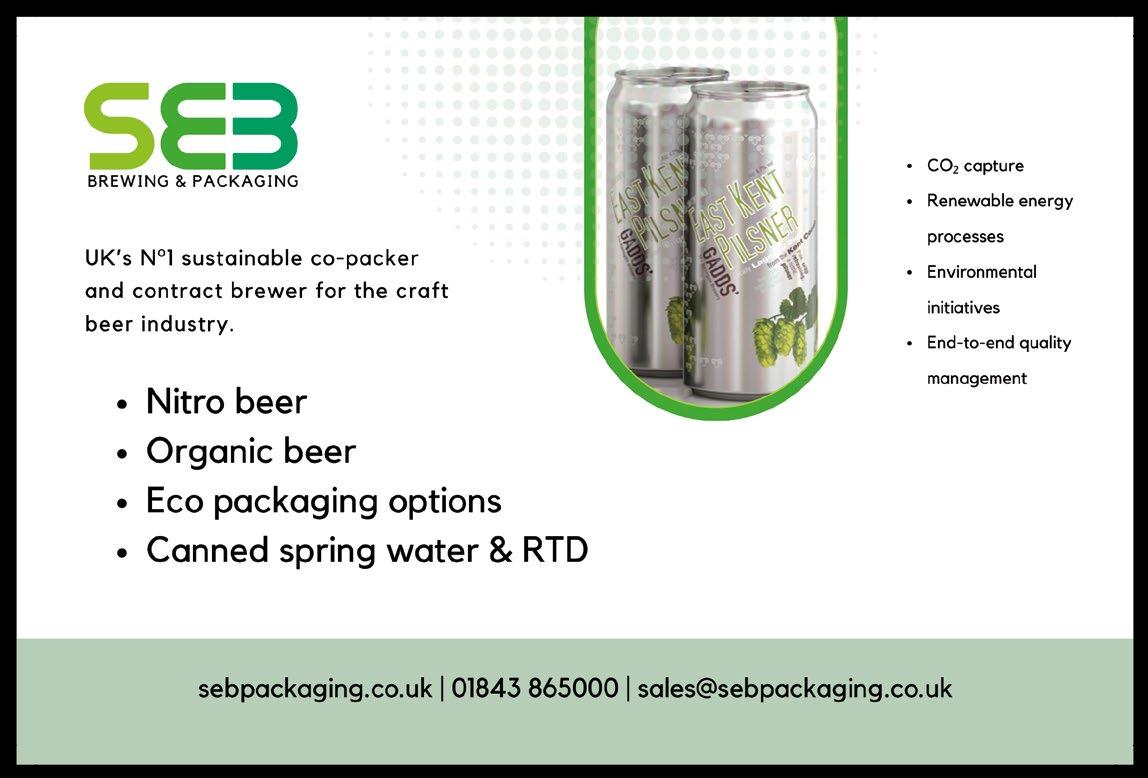
EUROPEAN DRINKS MANUFACTURER ROYAL UNIBREW MADE THE CALL TO UPGRADE PARTS OF ITS PRODUCTION SETUP AND IMPROVE ITS ECO-FRIENDLY APPROACH IN THE PROCESS. HERE, GARY ROBSON OF SURE PURITY OUTLINES THE ROLE THE BUSINESS PLAYED IN THIS PROJECT.
Royal Unibrew is a leading regional beverage provider covering Northern Europe, Italy, France and selected international markets. The company produces quality beverages such as beer, malt beverages, soft drinks as well as ciders and ready to drink products.
The carbon dioxide produced during fermentation is collected, purified and used to carbonate soft drinks at its production site in Faxe, Denmark. In addition to their own brands, they also produce soft drinks under license for Pepsico.
Ongoing compliance to Global quality directives as well as a proactive attitude towards innovative technology led Royal Unibrew to contact Sure Purity.
We cooperated on a project to replace a set of aging loose filled activated carbon towers that had been causing operational issues.
Royal Unibrew Quality CoordinatorAndreas Harpøth explains why Sure Purity was selected “We considered the suppliers approved by PepsiCo, Sure Purity offered a product that met our needs and offered a greater level of protection from a wider range of impurities compared to our previous system and gave the assurance we needed in the event of a CO2 related quality incident”.
Sure Purity assisted Royal Unibrew in sizing, model selection, lay-out and installation of the Carboguard system maintenance manager for brewing and utilities Jakob Agerbo Bach explains how the project went: “We contacted Sure Purity and explained the operational issues we were facing with the current equipment, they assessed our situation and offered a solution that not only addressed our issues but gave us
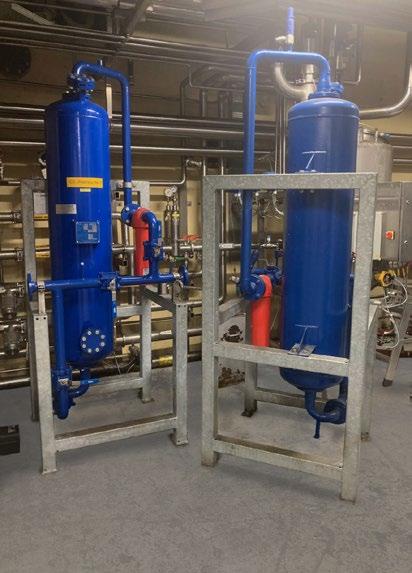
improvements in downtime and operational efficiency.
“The modular design of the cartridge filtration will substantially shorten maintenance time, by only having to change once per year it will also reduce downtime overall.
“I found the company to be very responsive, giving clear and complete answers to our questions, some of which were technically complex and unique to our brewery.”
The compact modular design of Carboguard means capacity can be expanded by adding modules. Integrated stage one and stage five high efficiency filtration removes Non Volatile and Volatile organic residues, entrained liquid and aerosol particles.
Stage two, three and four removes trace chemical impurities such as hydrocarbon and sulphur compounds found in sources of carbon dioxide.
EMBRACING CO2
RECOVERY TECHNOLOGY NOT ONLY ALIGNS WITH ENVIRONMENTAL GOALS BUT ALSO DELIVERS TANGIBLE BENEFITS FOR BREWERIES—PROMOTING SUSTAINABILITY, REALISING COST SAVINGS, PROVIDING A SHORT-TERM ROI, AND FOSTERING OPERATIONAL EXCELLENCE IN THE LONG TERM, EXPLAINS SAM LAWSON, FOUNDER AND DIRECTOR OF SSV LIMITED.
In today’s business landscape, prioritising sustainability and curbing carbon emissions is critical across all sectors.
With heightened consumer awareness and more stringent regulations, businesses face challenges in implementing changes that reduce their environmental impact.
For the brewing industry, a substantial contributor to carbon dioxide (CO2) emissions is the fermentation process, significantly impacting the carbon footprint of beer production. Recognising the urgency to address these emissions, breweries are increasingly adopting CO2 recovery systems as part of their sustainability initiatives.
These systems capture CO2 emitted during fermentation, purifying it for reuse in the brewing process.
This not only reduces atmospheric CO2 emissions but also yields significant cost savings, given the essential role of CO2 in beer production and the wide-ranging fluctuations seen over recent years in CO2 prices and the difficulty at times for breweries to secure supply.
SSV Limited is actively engaged in reducing its carbon footprint and has introduced the innovative Hypro CO2 Recovery Unit.
This system offers notable advantages over others, operating at moderate pressures of 15-18 bar, enabling breweries to leverage existing

infrastructure without the need for highpressure storage vessels.
The design minimises flashing losses, typically found in higher-pressure systems, resulting in enhanced efficiency, cost savings and overall value.
The Hypro unit boasts user-friendly operation with an intelligent monitoring system overseeing CO2 quality and managing the recovery process automatically. Its versatility can be further amplified by the option of a CO2 distillation column to achieve even higher purities. Notably, the Hypro CO2 Recovery unit eliminates the need to handle CO2 cylinders, enhancing safety and operational convenience in brewery
settings. Fully automated with PLC and remote access capabilities, it represents a cutting-edge solution for breweries committed to sustainability, operational efficiency, and safe practices.
Embracing CO2 recovery technology not only aligns with environmental goals but also delivers tangible benefits for breweries—promoting sustainability, realising cost savings, providing a shortterm ROI, and fostering operational excellence in the long term. By investing in innovative solutions like the SSV Limited Hypro CO2 Recovery Unit, breweries can actively contribute to a more sustainable future while reducing their environmental impact.
Established in 1876, Wells & Co. is an independent, family-owned pub management business based in the heart of Bedfordshire.
Overseeing around 30 managed establishments across the UK –from neighbourhood hangouts and countryside taverns, to friendly city centre stops – the company is headquartered at Brewpoint – a £14m state-of-the-art brewery specialising in small-run speciality ales and lagers. Following a period of reflection during the pandemic, Wells & Co. decided
to shake up operations and embrace a completely new approach that prioritises both the company’s impact on both the natural environment and the communities surrounding it. This shift required a complete evolution of the business, but one that the team wholeheartedly supported. In a climate where rising costs and sustainability are the key topics of discussion from brewers of all sizes, there is still a real hesitance within the industry to make the change from purchased CO2 to on-site nitrogen generation. Despite nitrogen generation systems being present in breweries across the country for 10+ years, brewers consistently share the same concerns. The first, quality – what happens to my DO level when making the change? Secondly, accessibility – nitrogen generation is for the big boys, it wouldn’t be suited to a craft brewer such as myself.
It’s understandable, your product is your reputation, and if the product is considerably worse, your customer is unlikely to take into consideration the thousands of pounds you saved by switching. Yet, with so many positive references out there already within the industry, this is a concern which should have been allayed long before now.
With nitrogen making up 79% of the air that we breathe, it is the most abundantly available gas in the world. The process of nitrogen generation is simply compressing ambient air, filtering out the oxygen and other impurities, and storing it. The nitrogen purity achieved is dictated by the amount of contact time with the filtration. If you flow the air through faster, less filtration takes place and therefore lower purity (higher O2 content) nitrogen is produced. Lower flow yields higher purity.
Well firstly, it’s not as big a risk as you think. With so many case studies within the brewing industry, the concept has been proven in a multitude of breweries making a multitude of beers. Anecdotally, I have heard of breweries running systems at nitrogen purities as low as 99.3%, with no issue with their DO. Secondly, costs have never been higher for breweries and, unfortunately, it is taking its toll on the industry – including some of the big names.
Brewers are seeing their costs increase at a much higher rate than they can pass on to customers, which becomes unsustainable.
As recently as 2022, increases in CO2 supply costs of 3000% were reported,

and that was for those who could get their hands on it. Even now, there is often a surcharge added to the invoice of customers, so the week-to-week cost is unpredictable.
In both 2018 and 2022, there have been CO2 crises which have highlighted the vulnerability of the supply chain. By taking control of their own supply, savvy brewers are reducing the reliance on third-party gas availability and the headaches this can bring. Finally, the brewing industry is one of the most conscious when it comes to their impact on the planet, which is commendable.
Many industries treat sustainability as a ‘nice-to-have’ where brewers, in the main, treat it as a genuine priority. Reducing their CO2 consumption and introducing nitrogen generation, it has a huge impact on the carbon footprint of a brewery’s beer.
I feel that whilst generally aware of the technology, the lack of knowing the finer details appear to be what are holding many brewers back.
Beer quality and DO is by far the biggest concern, as no amount of savings will compensate for a lesser product.
Alex at Full Circle Brew Co in Newcastle reports that he has converted everything other than carbonation (approx. 8085% of his prior CO2 usage) to nitrogen and achieves DO levels in the region of 30ppb – from a 99.9% system.
The carbon footprint reduction from moving away from delivered CO2 is also a huge benefit to brewers. With electricity being the only real factor in the nitrogen generation system, it often has a CO2e around 95% lower than delivered CO2 –not to mention the emissions of all the trucks on the roads delivering the gas. An overview of general industry figures are shown below, alongside an example of an average sized brewery:
With the kind of savings we are seeing, the average payback of the projects tend to be less than 2 years. So, what are the next steps?
u Still worried about what impact it will have on your product? Carry out your own trial with one of our rental units.
u Unable to commit to capital outlay at the moment? Utilise our finance package to allow you to save money every month from day 1.
u Planning to grow within the next 12 months? Great, rent one of our units until such times as you are ready to move forward with the larger system.
u Unsure on what size of system is right for your brewery? Speak to the experts!
u Want to learn how your savings stack up vs the figures shown?
Download the calculator on our website and fill in 4 cells for an instant savings estimation!
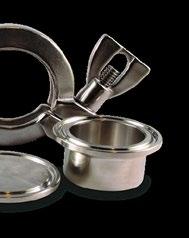

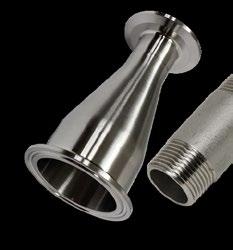







BY OPTIMIZING BREWHOUSE EFFICIENCY, DIVERSIFYING PRODUCT QUALITY, AND REDUCING ENVIRONMENTAL IMPACT, LIQUID HOP PRODUCTS ALIGN WITH THE GLOBAL CALL FOR A MORE SUSTAINABLE AND ECO-FRIENDLY FUTURE IN
SENIOR INNOVATIONS SCIENTIST AT TOTALLY NATURAL SOLUTIONS.
In an era marked by unprecedented ecological, economic, and societal challenges, industries worldwide must overhaul their practices to reduce resource consumption, reverse the effects of waste pollution and align with net-zero goals to mitigate the impacts of climate change.
The brewing industry is no exception, with market demands driving a collective effort among brewers and consumers to reduce their environmental footprint. Advanced liquid hop extracts have emerged as a valuable tool in achieving sustainability goals by enhancing brewhouse efficiency, beer diversification and product quality whilst concurrently reducing costs for breweries.
According to Persistence Market Research, the hop extract market is poised to double, exceeding $2 billion in the next decade.
While hop extracts have existed for years, recent technological advancements and innovations in the craft and global brewing industries have catapulted their status from a mere novelty to an indispensable ingredient for improving brewhouse sustainability.
Pioneering this evolution since 2011, we have played a leading role, employing patented fractionation techniques, innovative research and development, and close collaboration with hop farmers and brewers to ensure top-quality beer. Advanced hop extracts offer an array of options to brewers, serving as a versatile solution to enhance flavour, aroma, bittering, haze, and attributes of no/low alcohol beers.
Dry-hop substitution products have gained popularity as standardized, fully soluble, varietal-specific hop essential oil solutions, typically added during or post fermentation.
Switching from traditional pellet dry
hopping to liquid extracts can help brewers achieve their sustainability goals by eradicating the need for spent hop removal as demonstrated in a recent study published in Brewing Science, which showed that substitution of hop pellets with liquid hop extracts in a pale ale increased beer yield by 10.2%.
By eliminating the need for hop matter removal, hop extracts substantially reduce the amount of waste generated during the brewing process resulting in increased beer yield and overall profitability.
These benefits allow brewers to support the UN’s Sustainable Development Goal of responsible consumption and production, one of a package of UN policies designed to improve human lives and protect the environment.
The efficiency of essential oil extraction also sets liquid extracts apart. As reported by the Shellhammer group, University of Oregon, dry-hopping with pellets has an essential oil extraction efficiency of 33 – 51%, whereas dry-hop substitution products, such as the HopBurst® range provide 100% utilization rates. This increased efficiency translates into fewer hops needed to achieve equivalent results, reducing the demand for land, water, and resources, thus contributing to a more sustainable brewing process.
One of the most remarkable aspects of advanced hop products is the downstream diversification of wort streams in the brewing industry. This approach allows brewers to create multiple beer styles post-fermentation. This innovative approach involves splitting a base beer to incorporate various combinations of aroma, bittering, no/low alcohol, or haze products, offering unlimited possibilities for experimentation and product differentiation whilst significantly enhancing brewhouse efficiency. One of the most innovative tools in
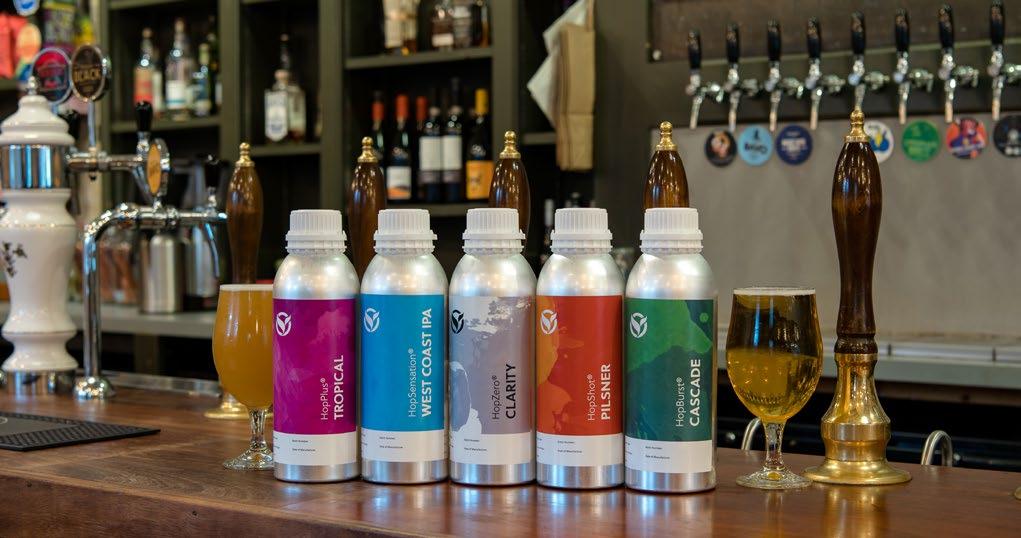
wort stream differentiation is a patented fractionation technique employed by Totally Natural Solutions that provides advanced extraction of essential oils from hops, allowing brewers to fine-tune the flavour, aroma and functionality of their beer profiles with unprecedented precision.
One of the outcomes of this proprietary process is the HopZero range, a 100% hop-derived product which removes undesirable attributes associated with low-alcohol and carbohydrate beers without resorting to energy-intensive processing. The patented fractionation technique, coupled with the exclusive use of environmentally friendly processing aids, ensures a sustainable and eco-friendly approach to brewing. However, the impact of reimagining one brew into various beer styles using only bright beer tank additions is wide reaching.
Due to their ready solubility and downstream addition, bittering and essential oil extracts can reduce the boil and dry hop tank residency timelines, remove the need for disposable hop filters as well as reduce the volume of water required for cleaning.
Furthermore, advanced liquid hop products can be stored at room temperature for up to two years, eliminating the need for refrigeration.
This increased efficiency translates into fewer hops needed to achieve equivalent results, reducing the demand for land, water, and resources, thus contributing to a more sustainable brewing process, Breeze Outhwaite
The recyclable and compact packaging not only reduces shipping and transportation energy but also lowers costs when compared to traditional hop pellets.
To ensure widespread adoption and awareness of the benefits of advanced hop extracts, education is key. It is important for brewers, industry professionals, and consumers alike to understand the positive impact that these sustainable practices can have on the brewing ecosystem.
However, it is equally important to provide pragmatic information to educate brewers and scientists on how to implement these products into the brewing process, from microbrewery all the way up to industrial scale.
In conclusion, the integration of advanced hop extracts is transforming the brewing industry’s sustainability landscape.
By optimizing brewhouse efficiency, diversifying product quality, and reducing environmental impact, these liquid hop products align with the global call for a more sustainable and eco-friendly future in brewing.
As brewers increasingly adopt these innovations, the industry moves closer to a harmonious balance between flavour excellence, ecological responsibility, and the exciting final product innovation.
TECHNOLOGY
FAR FROM BEING ABLE TO SOLVE ALL OF OUR PROBLEMS, BUT IT CAN HELP WITH SOME, EXPLAINS

It’s been an intense few years, no matter which part of the beer industry you work in. A pandemic gave way to supply chain challenges, inflation, insolvency, and to top it off – changing consumer tastes.
It has been hard to focus on anything other than survival and employee retention. But we are starting to see the new shape of the industry, and sustainability is thankfully becoming part of the dialogue again.
So let’s focus here, on sustainability. A word that is loaded with meaning, interpreted a million different ways, and frequently misused as a brand or profit tool. We will go through sustainability’s 3Ps here, people, planet, and profit, but in reverse order.
The quickest one to address is how focusing on sustainability can be profitable in a brewery. We all know how to optimize our processes – tweaking the grain bill to hit your targeted ABV, optimizing steeping and mashing temperatures, buying the right length
hoses to minimize transfer waste, being mindful of water and utilities consumption.
If you are in a larger brewery, you may also be looking at CO2 recapture and water reclamation/treatment as well. All of these actions have direct sustainability benefits.
Let’s take an example in grain consumption – in craft beer, many breweries aim a bit over the targeted ABV in order to not rip customers off (while staying within their regional taxation reporting requirements).
So what does it mean when you can remove one 25kg bag of grain from your recipes, while still giving your consumers the beer they want at the ABV you promise?
What does that savings mean over a month or a year? In short, you are then shipping less grain, using less grain, producing less waste, and having better extraction in your wort production. It seems simple, but this is a sustainable way to approach brewing.
Each of those actions can decrease your carbon footprint. So here, you directly see profitability integrating with that second P, planet.
And to continue with this grain example over to the people side of things, what if you can be sure that you are hitting the right ABV, regardless of who takes the measurement since you don’t need to prepare your wort or samples for measurement?
What does it mean when you have an archive of data that can better inform your production decisions?
This means that your teams’ work day is simplified, anyone can step in and support your QC team (or anyone can be part of your QC team).
It also means that the team can learn more together – data enables understanding and can help facilitate decision making. Having an instrument that helps you get the results in a way that makes sense for your team’s needs is helpful.
Let’s focus a bit more on people. Nothing in a brewery happens without the team, they truly define the brewery’s brand. Much is asked from the operations and production team in a busy and literally pressure-filled environment (the best advice I received my first day working in a brewery, from the best of all Yorkshire men, was ‘never forget a brewery is always trying to kill you’. His advice certainly saved me a fractured foot from a steel keg incident, but I digress).
And more will be continued to be asked from the team – Sales and marketing will need to figure out how to inform the production schedule as consumer tastes continue to evolve, and production will need to figure out how to maintain a high quality product throughout this journey, frequently learning on the fly.
How can this be done in a sane, sustainable, considerate way that does not shift more pressure onto team members who have been greatly impacted by the changing economic conditions?
To be blunt, we at Foss love our BeerFoss
FT Go, but we are well aware that one instrument can’t do everything. But here is what it ccan do for you.
It needs no sample prep, no sample degassing, nothing. It uses midrange infrared (FTIR) lasers to analyze wort, beer and hard seltzer, and it works very fast.
You can take a sample from your tank, walk over to the instrument and press go. It doesn’t need sample prep since CO2 is eliminated by the instrument, and there is a 55micron particle filter included with the sample tubes.
It takes only a few seconds for even the highest gravity, biggest dry-hopped beers, to seep through the filter.
BeerFoss currently measures ABV, density, SG, extracts, pH, calories, RDF, and ADF, and can be used to measure wort, fermenting beer, finished beer, and finished hard seltzer.
Because it is a turnkey solution, there is chance for operator error, anyone can measure any beer on a BeerFoss. I used to joke that it is so easy that a GM can do it, and I stand by this.
It also is designed with the user in mind, meaning there is no need to calibrate it, it is self-cleaning, And of course, the instrument has highly repeatable and accurate results. It has received satisfactory results in LGC/BAPS ring tests, and is currently undergoing a full methodology accreditation with all internationally-recognized standards.
There is a business saying that ‘you can’t manage what you can’t measure’. When it comes to achieving sustainability goals, measurements are key. How much time is your team now saving since they don’t have to waste an hour preparing samples?
How does this make their work day better? How much money are you actually saving when you trim your malt bill? And while BeerFoss can’t resolve the big industry problems, it certainly give you the data you need to make your decisions.
We are starting to see the new shape of the industry, and sustainability is thankfully becoming part of the dialogue again, Marian Elisa Reed